





WAYS TO BE AN Investigative Interviewer Locate, Surveil and Capture: A Bounty Hunter’s Journey Working PI Magazine 6353 El Cajon Blvd, Suite 124-605 San Diego, CA 92115-2600 [Now Reaching 25,000+ Private Investigators with Every Issue ] Private Investigators Summer 2024, Vol. 7 PI FIGHTS BACK: Sues Sparks Police There is no hunting like the hunting of man. – Ernest Hemingway
Your Job Isn’t Always Easy. Your Coverage Should Be.

“Easy to work with, year after year.” —Lex Steers
OREP Insurance Services, LLC. Calif. Lic. #0K99465

“I have used OREP for more than 10 years and have found them to be consistently helpful and a good value. I highly recommend them.” —Tom Jackson
“Easy to renew. Thanks!” —Larry Albertson



INSURANCE FOR PROFESSIONAL INVESTIGATORS GENERAL LIABILITY AND E&O COVERAGE—IN ONE POLICY WE KNOW INSURANCE Over 13,000 Professionals Trust OREP with Their Insurance OVER 1,000+ 5 Star Reviews on Google Resources on marketing, procedures, surveillance, and legal contracts to protect your business (see pg. 13 for details).
Specialized Insurance Designed for Professionals Like YOU • Blanket Additional Insured endorsement • Coverage for your independent contractors • Insurance Carriers Rated “Excellent” • Criminal, insurance, and clandestine investigations • Fire/Accident origin investigations • Wanted Persons investigations + E njoy Tools to Grow Your Business (OREP Members Only) Visit OREP.org/PI or Call (888) 347-5273

Editor’s Note by Tony Jones, Senior Editor
Contributors
Private Investigator Fights Back: Sues Sparks Police Department by Kendra Budd, Editor
Ways to Be an Investigative Interviewer by Joseph Mosley, MS, SHRM-CP, J&S Investigative Consultants
Differentiating Between Pre-Employment and Investigative Background Checks by Kelly E. Riddle, Kelmar Global
COVER STORY: Locate, Surveil and Capture: A Bounty Hunter’s Journey by Tony Jones, Senior Editor
Combating Burnout and Preserving Joy as an Investigator by Debra Allen, 808 Investigations
Working Sexual Assault Cases by Kendra Budd, Editor
A Checklist to Audit the Interrogation Process by John Gaspar and Anthony Luizzo
Forensic Firearms Facts for Investigators by Deborah Stonebarger, Analytic Investigations
New TALI President Puts His Stamp on Modernizing the Association by Tony Jones, Senior Editor
Mission
Working PI is published to help readers build their businesses, reduce their risk of liability and stay informed on important technology and industry issues.
Write Us at Working PI
Comments and letters are welcome. All stories without attribution are written by the Editor. Serving Private Investigators 5 4
Senior Editor Tony Jones | tony@orep.org
Editor Kendra Budd | kendra@orep.org


Working PI is published by OREP Insurance Services, LLC (Calif. Lic. #0K99465) and mailed to 25,000+ private investigators nationwide. The ads and specific mention of any proprietary product contained within are a service to readers and do not imply endorsement by Working PI. No claims, representations or guarantees are made or implied by their publication. The contents of this publication may not be reproduced either in whole or in part without written consent. 12 20 28 32 34 38 Publisher Isaac Peck | isaac@orep.org



Working PI 6353 El Cajon Blvd., Suite 124-605 San Diego, CA 92115 (888) 347-5273 subscription@workingpimag.com WorkingPImag.com
Senior Graphic Designer Ariane Herwig | ariane@orep.org 6 12 20 24 38 24
Like Us on Facebook! Facebook.com/workingpi
2 Working PI | Summer 2024
Summer 2024, Vol. 7
PUBLISHED BY We Know Insurance | OREP.org
6 16



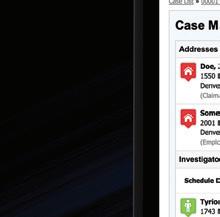



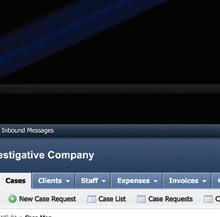










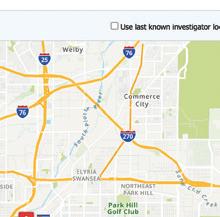





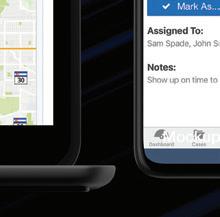



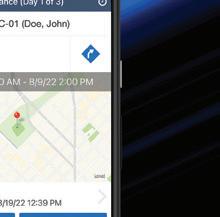


Finding Synergies With an Outside Perspective
Greetings! I’m the new guy. I’ve been on the job for a couple of weeks, and I can already tell I’ve got a lot to learn from you folks. My name is Tony, and I’m excited to join our talented editorial team as senior editor. As a way of introduction, I thought it would be helpful to step in front of the curtain and give you a brief overview of how my professional experience and content philosophies align with the guiding mission of Working PI.
As a career trade journalist and editor, I’ve spent nearly three decades learning, absorbing and covering a wide range of industries with the overarching goal to help small business operators succeed. That is best achieved by producing quality content that’s informative, educational and insightful.
Within that context, we strive to understand and alleviate your business pain points on myriad fronts. In this Summer 2024 issue, for example, Joseph Mosley, owner of J&S Investigative Consultants, details the Ways to Be an Investigative Interviewer on pg. 12, while Debra Allen of 808 Investigations offers insight to Combating Burnout and Preserving Joy as an Investigator on pg. 24.
Another component is to stay on top of and report on important trends, particularly if they help improve efficiencies, increase revenue and—critically—protect your business. To avoid critical missteps that could get you sued, be sure to read Differentiating Between Pre-Employment and Investigative Background Checks (pg. 16) by Kelly Riddle, president of Kelmar Global.
These principles all fall under the big-picture umbrella of what’s occurring in the larger market. It’s our job to convey how ripples at the highest levels may affect you and impact your business. It’s also our goal to bring issues and stories of special interest to your attention. The collective nuances that comprise the PI space are what make it distinct and worthy of dedicated, insightful coverage.
As such, we continue our coverage of the ever-twisting Schieve vs. McNeely et al. case in Nevada in which a private investigator is fighting against being compelled to reveal the name of who hired him. To read the latest, turn to pg. 6. In addition, this issue’s cover story (pg. 20) delves into what it’s like to be a real-life bounty hunter and explores how their day-to-day compares with a PI’s.
My goal is to be a worthy steward in upholding the high standards that have already been set for the magazine, while adding value to our coverage. Your input is crucial. If you have story ideas, big-picture thoughts about the investigator industry and profession, or otherwise just wish to reach out and connect, please don’t hesitate to email me at tony@orep.org.
 Tony
Tony Jones, Senior Editor of Working PI
Tony
Tony Jones, Senior Editor of Working PI
4 Working PI | Summer 2024 EDITOR’S NOTE

Deborah Stonebarger
Deborah Stonebarger is the owner of Analytic Investigations in Arizona. She is a licensed Private Investigator and a former Senior Criminalist with the California Department of Justice. Ms. Stonebarger was certified in Comprehensive Criminalistics by the American Board of Criminalistics and is experienced in the analysis of crime scenes and evidence collection, biological evidence and DNA, controlled substances, and forensic firearms analysis. She currently serves as Secretary for the Arizona Association of Licensed Private Investigators (AALPI). Contact her at deb@analyticinvestigations.com.

Kelly E. Riddle
Kelly E. Riddle is the President of Kelmar Global and the PI Institute of Education, training more than 7,500 PI’s since 1989. With more than 41 years of investigative experience and author of 16 published books, he is one of only 50 PIs who’s a Texas Certified Investigator. He has been the guest speaker at more than 650 events and has been on national TV, radio and newspapers. Riddle is also the founder and President of the Council of Association Leaders, Association of Christian Investigators, and a graduate of University of North Alabama where he earned a Bachelor of Science degree in Criminal Justice.

Tony Jones
Tony Jones is Senior Editor of Working PI magazine, published by OREP, a leading provider of E&O insurance for real estate professionals. Based in San Jose, California, he has nearly 30 years of business publishing experience and graduated with a bachelor’s degree in journalism from the University of Arizona. To reach him, email tony@orep.org.
John Gaspar

John M Gaspar, B.S, M.S, CFE, BAI CSI is the Immediate Past President of the Florida Association of Private Investigators (FAPI), Former President of the Society of Professional Investigators, Past Chairperson of the Board Accredited Investigators (BAI), Retired NYP Major Case Squad Detective, and Retired FCSO Detective Supervisor of the Economic Crime Division.

Anthony Luizzo
Anthony has a longdistinguished career in law enforcement with the NYPD, as a senior security executive with the NYC Mayor’s Office of Economic Development and the NYC Health & Hospitals Corporation, and as President of his PI firm.
Kendra Budd

Kendra Budd is the Editor of Working PI magazine and the Marketing Coordinator for OREP. She graduated with a BA in Theatre and English from Western Washington University, and an MFA in Creative Writing from Full Sail University.
Joseph Mosley

Joseph Mosley is the Principal Investigator and owner of J&S Investigative Consultants in Flint, Michigan. He holds a bachelor’s degree in health sciences from the University of Michigan and a master of science degree in investigative sciences, with an emphasis in financial crimes and security, risk and resiliency, from the University of New Haven in Connecticut. He’s working toward a doctorate in criminal justice. Joseph has researched investigations and criminology, and his work focuses primarily on the conventions implored by the different sectors of the criminal justice system in the United States and worldwide. To reach him, call (810) 962-7088; email hi@jspiconsults.com; visit www.jspiconsults.com.

Debra Allen
A retired homicide detective, Debra Allen has been a private investigator for 20 years and is licensed in Hawaii, California and Arizona. She formed 808 Investigations in Honolulu to fulfill her dream to live in Hawaii. Among her passions has been working on cases that involve crimes against children. In that regard, Debra recently became the Hawaiian Islands’ Team Adam Consultant for the National Center for Missing & Exploited Children, through which she’ll donate her services and expertise working as a liaison with law enforcement on exploitation and longterm missing-children’s cases via the NCMEC’s vast resources.
5 Summer 2024 | Working PI
CONTRIBUTORS

Private Investigator Fights Back: Sues Sparks Police Department
by Kendra Budd, Editor
“Even lawful actions an investigator might make while conducting business can carry significant risk.”
As the long, twisting saga of Trackergate continues, a private investigator in Nevada has continued to push back even as he’s on the precipice of being compelled to reveal the name of his client in court.
Beginning with our Spring 2023 issue, Working PI delved into the Nevada case of Schieve vs. McNeely et al ., in which Hillary Schieve, the longstanding Mayor of Reno, sued private investigator David McNeely after finding a GPS tracker on her vehicle.
Schieve discovered the device just a week before the city’s general election on Nov. 8, 2022 and filed her lawsuit almost immediately after detectives traced the device back to McNeely. She accused him, as well as his client (John Doe), of invasion of privacy, violating Nevada’s anti-doxxing laws, trespassing and civil conspiracy.
In a follow-up story in our Fall 2023 issue, we discussed how former Washoe
County Commissioner Vaughn Hartung added his name to the lawsuit, after a local media investigation discovered McNeely had also surveilled Hartung for the same client using the same GPS tracker. Though District Court Judge David Hardy ordered McNeely to reveal the name of the person who hired him, the private investigator successfully appealed the issue to the Nevada Supreme Court, arguing that the identity of his client is a trade secret and an investigator-client privilege exists to protect the client’s identity.
The case has made waves across the state’s political spectrum and already resulted in Gov. Joe Lombardo signing legislation (Assembly Bill 356) that makes it a crime to put mobile tracking devices on another person’s vehicle without the owner’s consent (except for law enforcement). The law went into effect July 1, 2023.
Meanwhile, those following the case closely, including legal investigators,
have been waiting to see if McNeely would be forced to give up the name of who hired him. Though several appeals filed by McNeely have enabled him to keep his client’s identity a secret, the Nevada Supreme Court in April unanimously dismissed McNeely’s argument, effectively allowing Judge Hardy’s order to stand.
In additional legal action, McNeely subsequently sued the Sparks, Nevada, Police Department (SPD) for unlawful search and seizure, as well as damages, in connection to the initial investigation that led to the Schieve lawsuit against McNeely.
Here’s what we know regarding the latest developments.
McNeely Sues
Through several appeals and the public nature of the Schieve lawsuit, which the local press has aptly dubbed Tracker-
page 8
Working PI | Summer 2024 6
Do you struggle with the “cash flow” part of your business?
Are you ready to grow your business but don’t know the mechanics of working with subcontractors or employees?
Want to develop a more consistent work product?
Want to market your business to attorneys but not sure how to go about it?
 - Dorothy Grutzner Vandergrutz Investigations Agency
- Dorothy Grutzner Vandergrutz Investigations Agency

Grow Your Business and Your Revenue with TheProfitablePI.com
If you’re better at investigating than running a business, you’re not alone. The Profitable PI’s series of Books and Manuals help you supercharge your marketing and streamline your business operations, so you can increase your profit margin. TheProfitablePI.com These are GOLD! Using these manuals takes the guesswork out of the expectations for a quality investigator.
Earn More Now at: Download Book or Manual Apply Learned Skills to Grow Your Business Enjoy the Rewards from Higher Profits These fantastic manuals provide a long overdue need for private investigators to set up their businesses for success. - Kim Ridding, CDS, CDI-FTER “Investigators in Cars, Drinking Coffee” On YouTube: @InvestigatorsInCars
page 6
gate, McNeely has claimed his career and business have taken a substantial hit. Late last year, he decided to punch back via a separate lawsuit against the SPD.
In the federal court filing, McNeely’s attorney, Sigal Chattah, claims “Sparks police were improperly trained in search and seizure principles and safekeeping private information,” wrote Mark Robison of the Reno Gazette Journal. The lawsuit alleges that Sparks police violated McNeely’s constitutional rights in their efforts to appease Schieve, who was in the final stretch of the Reno mayoral election.
The suit accuses Police Chief Chris Crawforth and detectives Peter Loeschner and Kevin Dach of engaging in unlawful conduct that caused “financial ruin, humiliation and destruction of McNeely’s life and livelihood.” As one example, the business website for McNeely’s private investigative firm, 5 Alpha Industries, has been offline since the genesis of the Schieve case.
In the filing, Chattah alleges that the phone record subpoenas that led SPD to McNeely were mishandled and out of compliance with SPD protocol. She also argues that since McNeely’s actions didn’t break federal or state law (at the time), his identity throughout case proceedings should have been kept anonymous. From the lawsuit:
McNeely was retaliated against including but not limited to the following: 1) Obtaining evidence unconstitutionally through the use and abuse of Administrative Subpoenas; 2) Unmasking his identity to Schieve; 3) Encouraging Schieve to take legal action against McNeely; 4) Encouraging Schieve to contact public officials to pass laws against McNeely’s conduct; 5) Encouraging Schieve to violate McNeely’s anonymity and publicize McNeely’s identity and acts. … Most significant though, there was absolutely no public interest in disclosing McNeely’s identity, allowing for retaliation against him—other than to ingratiate a public official.
The lawsuit maintains: “The unmasking and public dissemination of McNeely’s identity has subjected him to public humiliation, civil litigation for engaging in completely lawful conduct, public embarrassment and a complete destruction of his livelihood as a private investigator.” It also calls SPD’s actions “intolerable” and “extreme.”
McNeely seeks compensatory, punitive and general damages—including for past and future physical and mental suffering—in addition to recovery of attorney fees and termination of the two detectives without severance.
Case Dismissal
The city of Sparks subsequently filed a motion to dismiss the case, and on May 13, U.S. District Judge Larry Hicks did just that, calling McNeely’s arguments that his First and Fourth Amendment rights were violated as “unpersuasive and unsupported.” Hicks dismissed the case with prejudice. Though that means a similar lawsuit cannot be refiled, McNeely can still appeal the court’s decision.
On McNeely’s claim that his “First Amendment right to privacy, speech and petition” were violated, Hicks opined that “the First Amendment neither provides Plaintiff a ‘right to privacy’ nor prohibits Defendants from notifying the Mayor of Plaintiff’s identity under the circumstances.”
In addressing McNeely’s Fourth Amendment claims, Hicks wrote: “Plaintiff fails to state a Fourth Amendment claim that is plausible on its face. Plaintiff cannot show that he had a legitimate expectation of privacy against Defendants use of administrative subpoenas to identify the source of the GPS Tracker secretly installed on the Mayor’s vehicle. Nor can Plaintiff show that he had a legitimate expectation of privacy against Defendants disclosing his identity to the Mayor during the course of SPD’s investigation.”
In coming to that conclusion, Hicks used McNeely’s experience as a private inves-
tigator and retired law enforcement against him, writing that McNeely “is undoubtedly familiar with police investigations” and “surely understood the serious nature of Defendants’ investigation.” As such, the judge surmised that McNeely should have known his name would be revealed but “did not request that his identity be withheld from the Mayor, nor did Plaintiff even raise any hint of concern as to his ‘anonymity.’ Rather, after being discovered, Plaintiff unapologetically admitted to installing the GPS Tracker on the Mayor’s vehicle and tracking her location.”
The judge further asserted: “Even if Plaintiff could establish a subjective expectation of privacy, he cannot establish that society is prepared to recognize it as objectively reasonable. Plaintiff cannot show that he had a legitimate expectation of privacy.”
Hicks also dismissed out of hand McNeely’s claim under Nevada law that he suffered “intentional infliction of emotional distress” (IIED). To prove that assertion, McNeely would have to successfully argue that SPD’s revealing of his name amounted to “extreme and outrageous conduct.” “Under the circumstances, this is simply not an action under which an IIED claim could be successfully alleged against Defendants because no extreme and outrageous conduct on the part of Defendants occurred, whatsoever.”
John Doe to Be Unveiled?
While the dismissal of McNeely’s lawsuit against SPD is a personal and professional setback (pending appeal), the larger ramifications of a private investigator being forced to reveal a client are still at play. The Nevada Supreme Court’s rejection of McNeely’s assertion of investigator-client privilege and identity protection as a trade secret was a serious blow that will likely result in the unveiling of John Doe’s real name, but Doe himself is also fighting to protect his identity.
page 10
Working PI | Summer 2024 8

You may recall that days after Washoe County Judge Hardy ordered McNeely to divulge his client ’s identity, Doe filed a motion for summary judgment with the Nevada Supreme Court, stating that he never ordered McNeely to place the tracking device on Schieve’s vehicle and alleging his right to privacy was being violated.
The motion claims “Defendant John Doe is a resident of Washoe County who is concerned with potential corruption and malfeasance in local government,” which he asserts he has the right to uncover as a voter. Doe claims he hired McNeely to investigate Schieve and Hartung for “serious misconduct.” Though the Nevada Supreme Court’s April ruling rejected McNeely’s claims, the court didn’t weigh in on Doe’s motion.
Interestingly, Doe subsequently filed another motion for a protection order to keep his identity secret. It states: “John Doe has the right to engage in anonymous political conduct, including defending himself in this Court under a pseudonym, and this Court should issue a protective order shielding John Doe’s identity from disclosure.” Doe argues his actions in hiring McNeely were protected under the First Amendment and that he only wished to uncover if Schieve and Hartung were participating in misconduct as he had heard through rumors.
The protection-order motion raises a California case in which attorney Bruce Tichinin was fired from a committee by the city council after hiring a private investigator to uncover whether two local officials were having an affair. Tichinin sued, alleging the city council’s actions defamed him and hurt his business. According to Doe’s motion, the court ruled in Tichinin’s favor, citing that hiring a private investigator falls under the right to free speech.
The motion also argues that Schieve and Hartung should be satisfied with the outcome of the case thus far without
needing to know who Doe really is: “John Doe has appeared in the district court case and is represented by counsel. He is now a part of the litigation. Discovery regarding John Doe’s legal identity now serves no real purpose at all—except to interfere with John Doe’s right to anonymously engage in political activity.” However, if Schieve and Hartung want to press charges against McNeely’s client specifically, they cannot do so without knowing his true identity.
In their response, attorneys for Schieve and Hartung called into question the legitimacy of the John Doe motions, even raising the possibility that they weren’t filed by the same person and, thus, can’t be taken seriously, according to the Reno Gazette Journal . “John Doe is not a valid party to this litigation,” the attorneys wrote. “Plaintiffs request that the Court strike all filings by John Doe, which are rogue and fugitive filings that have no legal effect.”
At press time, Judge Hardy had not issued a ruling. Given what’s transpired in the last year in relation to these legal actions, additional back and forth is likely, even if it only delays the inevitable. If Hardy denies the latest John Doe motion, he’ll still have the opportunity to appeal to the Nevada Supreme Court (again).
Thus, it might be some time before John Doe’s true identity comes to light. However, as we previously reported, the name floated by Schieve to SPD was Robert Beadles.
Who Is Robert Beadles?
Beadles, a member of the Washoe County Republican Party’s Executive Committee, previously funded two unsuccessful recall campaigns against Hartung and runs a blog where he has referred to Schieve as “Hide’n Hillary Schieve.” Last year, he sued three Washoe County officials in state court, alleging voter fraud and seeking to get them removed from their positions. The county officials targeted were Jamie Rodriguez, then-Washoe County
registrar of voters; Eric Brown, county manager; and Alexis Hill, county commission chair.
So, where does that case stand, and could it be why Schieve suspects he’s the one who hired McNeely to track her?
According to the Reno Gazette Journal , Beadles withdrew his lawsuit, which had been moved to federal court, after the Washoe County District Attorney’s Office sent him a warning letter that sanctions would be pursued. The letter called his claims “inaccurate rantings of a conspiracy theorist.”
Beadles then removed two causes of action that alleged violations of the 14th Amendment and filed an appeal with the Nevada Supreme Court. The focus of the revised lawsuit was narrowed to remove the county officials from office who hadn’t addressed his election grievances. Nevertheless, his overall goal remained the same: “It’s quite simple; I need to be in state court as the 2 main causes of action I seek are the removal of the ROV (registrar of voters), County manager, and County Commission Chair and to expose our election issues, then correct them,” he wrote in a blog post.
While Beadles maintains Nevada law ensures that “Each voter has the right … to have complaints about elections and election contests resolved fairly, accurately and efficiently,” the district attorney’s letter counters that Rodriguez, Brown and Hill had no duty to respond to him.
Beyond targeting Rodriguez, Brown and Hill, Beadles’ many grievances include issues with voter registration, election ballot counting and signature verification. The DA’s office has disputed all claims. A fact-check published by the Reno Gazette Journal states: “Affidavits do not show Washoe votes were cast without voters’ consent, as Beadles claims.” Washoe County spokesperson Bethany Drysdale also told the publication that the county conducts fair and accurate elections.
Working PI | Summer 2024 10
page 8
Beadles demanded the Supreme Court stop Rodriguez, Brown and Hill from “using any voting and tabulation machines for election in Washoe County” and called for only paper ballots to be used at polling locations in all Nevada elections.
On May 15, the state supreme court denied his appeal. “Taking all the factual allegations in the complaint as true and drawing every inference in favor of Beadles, he can prove no set facts that would entitle him to relief as pleaded,” the justices ruled.
Though on its face Beadles’ case has no direct connection to Schieve or Hartung, it does reflect his ever-continuing criticism of elections and elected officials in the state. It’s not a stretch to see why Schieve believes he could be the one who hired McNeely.
For now, though, everyone continues to wait to learn John Doe’s true identity.
Final Thoughts
These cases have raised interesting questions with respect to constitutional rights and privacy laws. Trackergate has already impacted private investigators in Nevada via related legislation that rescinded their ability to place tracking devices on target vehicles. The latest court rulings place additional risk on the notion of investigator-client privilege in Nevada and a PI’s ability to protect the secrecy of their clients. Without protections in place, what else could a licensed investigator be compelled to reveal?
The dismissals of McNeely’s supreme court appeal and lawsuit against SPD drastically reduce his options going forward, and John Doe’s path to protecting his own identity appears to have similarly hit a dead end barring another Hail Mary to the Nevada Supreme Court. Meanwhile, Schieve and Hartung appear to be on the verge of learning
who hired a private investigator to track them, with additional legal action likely to follow.
With final outcomes still pending, the full ramifications for private investigators—including potential new liabilities— remain unknown. However, as Working PI has previously reported, the Schieve case makes clear that even lawful actions an investigator might make while conducting business or an investigation can carry significant risk in the civil arena.
We will keep a close eye on this case to observe its outcomes and determine if John Doe’s identity is finally disclosed.
Stay Informed
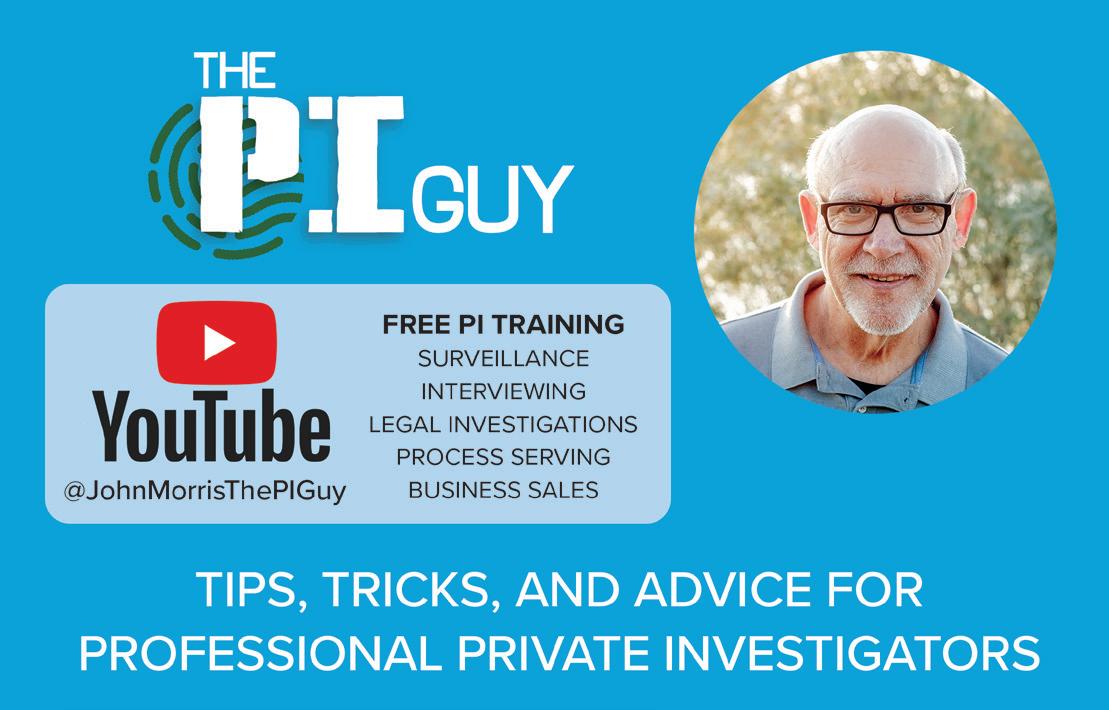
11 Summer 2024 | Working PI
Opt-In for News at WorkingPImag.com

Ways to Be an Investigative Interviewer
by Joseph Mosley, MS, SHRM-CP, J&S Investigative Consultants
“Accurately assessing an interviewee’s attributes can play a key role in concluding an investigation.”
Investigative interviewing is an art as well as a science. As such, there are many steps to master to achieve an optimal outcome. In this article, we’ll examine the four components that comprise the core of an interview and offer insight to crucial skills and strategies that will help you hone your techniques.
Preparation
Of course, for any interview to be successful, the interviewer must prepare thoroughly. Preparation is the fuel that propels the entire interview process. This includes gathering as much information, documentation and on-hand knowledge as possible. Prior to any proposed interview, extensively research the topics that will be part of any dis-
cussions as well as the interviewees themselves. Before you sit down with an individual, you must have a handle on all the facts and moving parts of an investigation as well as any specific issues that prompted the need for an interview. This will allow you to formulate the best questions to ask.
Establishing pre-interview goals and location parameters is vital to the process. Make sure each interview subject understands the process and that witnesses comprehend the value of cooperation, now and in the future. As the interviewer, you also must be mindful of any rapport between witnesses and interviewees. In addition, you should also consider opportunities to assess
non-verbal communication (we’ll discuss this in a bit) and obtain succinct and truthful statements. You also need to assess any cultural, gender or racial issues that may be present during the interview and investigative process. This includes determining ahead of time if an interpreter will be needed during an interview.
When considering an interview location, keep in mind that complainants often prefer to convene in a neutral location. Most interview environments should be private, comfortable and clean. Audioand video-recording equipment also should be considered. Principally, the location should be free of distractions
page 14
12 Working PI | Summer 2024
Take Your Business to the Next Level Toolkit for Professional Investigators
1 2 3
Hone New Skills Expand Your Business Increase Your Income
OREP is more than just another Insurance Agency As an OREP Member, you get access to an unrivaled training suite of products to help you build your skills and grow your business (at no additional cost).
Learn from the Best Training, eBooks, and Contracts from experienced attorneys and industry-leading private investigators (Kelly Riddle and Mark and Wendy Murnan).
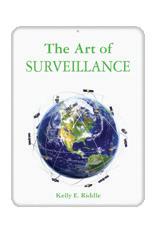
The Art of Surveillance
Conducting surveillance correctly is truly an art. This eBook shows you how to avoid common mistakes, use proper equipment and different concealment techniques; includes a section on international investigations.

Secrets of a PI Agency: Marketing and Management
Good investigation techniques will only get you so far. Learn from one of the leading investigators in the nation how to grow your agency like any other business by utilizing savvy marketing techniques and business skills.

Marketing to Plaintiff Attorneys
Learn valuable strategies and techniques for marketing your agency to plaintiff attorneys! Many PIs ignore this high-value niche that pays higher hourly rates.

Subcontractor Manual
Step up your game when it comes to dealing with subcontractors. Set clear expectations on how subcontractors should handle confidential information, interact with clients, and navigate insurance requirements.

Things They Didn’t Tell You (About Starting a PI Business)
Why struggle to get your business up and running when you can rely on the experience of someone who has been in business for more than 40 years? This book is a road map for anyone serious about starting a PI business.
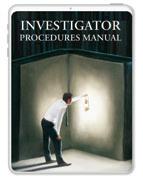
Investigator Procedures Manual
Shorten the learning curve and increase your own (or your new hire’s) productivity, as well as your agency’s profits! This pre-formatted procedure template helps you build business processes for success.

Business Plan Template
Use this as a template for the growth of your PI business. Kelly E. Riddle shows you how to set your services apart from others, define what market you serve, the types of services you provide, how you will market the business, its financial history, business expansion, and more.

8 Hour CE Class: “Surveillance Strategies for Success”
Learn key strategies and tips to successfully execute surveillance operations as a private investigator.

Engagement Letter
Enjoy a templated Engagement Contract prepared by an attorney and former FBI agent.
Subcontractor Agreement
Prepared by an attorney and former FBI agent.

Access Available to OREP Members Only Join at: OREP.org/PI-Members Calif. Lic. #0K99465
BONUS
PI Toolkit OFFERED BY:
or potential interruptions, including any people and telephonic/communication devices that could disrupt the smooth flow of the interview.
Avoid locations in which you cannot control the environment, such as people’s homes, restaurants or coffee shops. These types of locales are rife with privacy and confidentiality concerns. Telephone interviews are OK; however, in many circumstances, it’s best to make sure the interviewee avoids using a speakerphone. In today’s technologydriven world, video chat, video software and other modern-conferencing options can be considered when attempting to schedule an interview with witnesses and subjects of interest.
The Interview Process
When it comes to conducting interviews, there are four core components to consider. Let’s take a look at each component before we delve into some specific strategies and techniques.
Orientation and Building Rapport: The outset of an investigative interview is about orienting the witness or person of interest and developing a positive rapport. This includes the setting and tonality of the interview as well as your direction. Consider the maxim that you don’t get a second chance to make a first impression, including your personal appearance.
Before delving into your prepared, caserelated questions, explain to the interviewee why you are there and how you can help. Ask them if they have questions about the interview and the overall process. This is vital to establishing and maintaining transparency between you and the subject, and crucial to helping them feel comfortable in the situation and favorable toward you.
People will be more cooperative and forthcoming when they’re comfortable and feel like they have some familiarity with you. Further, this step is important in establishing a baseline for the interview process, in which you can compare the subject’s initial, exhib -
ited reactions and general behaviors to those expressed during the high points of the interview.
Narration and Questioning: The initial step of this portion of the interview allows the interviewee to narrate or provide details pertinent to your investigation before you further lead the discussion and ask follow-up questions for clarity. Make sure not to interrupt the subject during this segment and ensure the steps you’ve taken to minimize or eliminate disruptions (people in the building and other distractions) are in place. Failing to allow interviewees the opportunity to narrate is a common mistake many interviewers make.
Once the subject has concluded, you have the opportunity to clarify remarks and details as well as cover additional topics that need to be discussed. Execute this portion by asking specific, guided questions designed to achieve a positive outcome. It’s important to avoid asking closed-ended as well as convoluted or “jumbo” questions that are difficult to follow or understand.
In addition, avoid drilling the witness or subject while interviewing them as well as using embarrassing or derogatory words and phrases. You want to ensure each segment of the interview process is pure and explored entirely. Refinement and seeking clarity are crucial during the interview process.
Open-ended questions are the key to unlocking helpful answers and expanding on the knowledge you had prior to the interview. Remember, you’re looking to draw out more information, paint a complete picture, confirm someone’s position on a matter or thoroughly understand an issue. Instead of asking leading questions that suggest answers, ask questions designed to clarify the gaps in the interviewee’s story. Making relevant reference points in your notes during the narration period is critical to identifying the areas that require follow-up questions for clarification.
Keep in mind that the human memory often requires aid to pluck out details and facts. Make sure you have relevant documents that you gathered prior to the interview available to help the subject recall important details and facts. The biggest challenge is often when a witness requires more prompting or assistance when reciting a series of events, so come to the interview prepared.
Interview Summation: The third component of the interview allows the interviewer to make sure all the information discussed by the interviewee is correct. You can achieve this by cueing and referencing the important points discussed. If you need to elicit further information from the subject, once again ask pertinent, open-ended questions.
Closure: The fourth step of a successful interview is to provide proper closure. This is your opportunity to make sure the entire interview has been thoroughly conducted and completed to the highest order. This step should establish a sense that the witness or subject will continue to cooperate with you through the entire investigative process. You also want to take steps to ensure the interviewee feels good about the process and overall experience.
Skills and Techniques
Now that we’ve established the four primary components to an investigative interview and their purpose, following are some important considerations that can help you sharpen your interview skills and techniques.
Overcoming Language Barriers: As mentioned earlier, you need to be aware of any language barriers prior to conducting a formal interview. Always use a qualified interpreter if an interviewee’s primary language is not English. Never rely on family, friends or a co-worker who speaks the same language as this can create a level of bias. Every word must be translated during an interview as well as in the interview transcript. To minimize distraction and ensure the subject
14 Working PI | Summer 2024
page 12
speaks directly to you and not the interpreter, it’s a good idea to have the interpreter sit behind the interviewee. Always maintain a level of specificity in your questions. Remember, exact facts are always required, and not all subjects are forthcoming with their answers or readily share information with interviewers.
Taking Notes: When taking notes during an interview, always include the interviewee’s name, the date, time and location. You should explain early in the interview that you will be taking notes and why. During the interview, take notes consistently rather than sporadically because interviewees may perceive a sporadic note to be more heavily weighted than others. Write legibly, and keep all of your rough notes with the assumption that what is written down will be seen by all parties. In fact, be conscientious about writing down personal thoughts. Notes should be free from subjectivity and bias, so if a personal note is warranted, consider writing it down on a separate piece of paper, not the official notepaper. At the conclusion of each interview, make it a habit to ask the subject or witness to sign your written notes.
Remember, notetaking should always be conducted during the course of
the interview, not after it’s over, and take notes even if you’re recording audio or videotaping.
Detecting Evasion: As the interviewer, you should carefully consider interviewee responses that include phrases like “that’s it” or “that is all I can remember.” You’re looking for detailed answers that precisely address the questions being asked, not generalized or evasive responses. In fact, generalized answers are usually an admission. The witness or subject knows the question being asked, and a general answer is a sign that they potentially know more than what they are sharing. When this occurs, continue to probe for specific answers. Remain calm and repeat the query to explain why the question is being asked. Keep in mind, that it may be necessary to rephrase the question and remind the interviewee what they did during a specific event.
Assessing Non-Verbal Cues: To assess the interview subject’s credibility, you must observe their eagerness to be interviewed as well as their behavior during the session. Their responses are vital to corroborating gathered information, documents and other material obtained during the investigation. Be
observant of their exhibited stress level during the questioning period, and be cognizant of their body posture. In addition, be keenly aware of any opposites displayed, such as verbally saying “yes” while nodding no. Similarly, pay attention to any hand wringing or fidgeting, as these characteristics can be indicative of attentive psychological issues. Also, one should strive to ensure the interviewee’s normal behavior and ability to remain alert during the interview.
Final Thoughts
Accurately assessing an interviewee’s attributes can play a key role in concluding an investigation. Though the interviewing process can be stressful for many witnesses and parties of interest, it’s a vital element of any investigation.
This article is intended as an overview of traditional approaches to investigative interviewing. As mentioned at the outset, this pursuit combines art and science. Mastering techniques takes time, practice and the attainment of specific skill sets. Apply the information discussed here to other practices and experiences as you build your understanding and application of investigative intervention conventions.

15 Summer 2024 | Working PI
Visit OREP.org/Security or Call (888) 347-5273
Coverage designed specifically for security guards and security contractors — nationwide. All-inclusive insurance for your needs: General Liability Business Auto Worker's Comp Excess Liability And More! Calif. Lic. #0K99465
Insurance for Security Professionals

Differentiating Between Pre-Employment and Investigative Background Checks
by Kelly E. Riddle, Kelmar Global
“Investigations of insurance claims, non-employment backgrounds and litigation support (to name a few) are not covered by the FCRA.”
Is there a difference between a preemployment background check and an investigative background check? While the short answer is a significant “yes,” it’s important for private investigators to understand the distinctions because failing to do so can put you in line for a lawsuit.
Pre-Employment
The most significant difference to keep in mind is pre-employment background checks are highly regulated, with their parameters falling under many governmental agencies and laws. Particularly germane is the federal Fair Credit Reporting Act (FCRA), enacted in 1970.
Don’t let the name fool you. While the FCRA was designed to regulate the use of consumer credit reports, it has direct
oversight over pre-employment background checks. Subsequent amendments that went into effect on Sept. 30, 1997, ensure (1) that individuals are aware that consumer reports may be used for employment purposes and agree to such use, and (2) that individuals are notified promptly if information in a consumer report may result in a negative employment decision.
Critically, the employer must have written authorization to conduct a preemployment background check, and the candidate must be given notice if there is any “adverse information” found during the research. The FCRA requires that the candidate be given a copy of the report and ensures they have the right to contest the findings and ask for a reinvestigation.
Private investigators conducting preemployment background checks are considered a “consumer reporting agency,” and the subsequent reports they produce are considered “consumer reports” under the FCRA when they serve as a factor in determining a person’s eligibility for employment, credit, insurance, housing or other purposes.
You should also be aware that the FCRA limits the length of time in which offenses can be reported. Typically, you can only report convictions going back seven years, and the consumer reporting agency (private investigator) has a duty to report accurate information. If the record is incomplete by failing to provide the final disposition or similar
page 18
16 Working PI | Summer 2024
Learn from the Best + Develop Your Skills




Learn real-life investigative techniques to help you grow your business! Kelmar Global’s book catalog features 14 books written by Kelly E. Riddle. With more than 40 years of investigative experience, Mr. Riddle shares his strategies and standards that have made his firm one of the most successful PI firms in the world. Books Sold BUY NOW: www.KelmarGlobal.com/books-video-tapes-software/
Have a case we can help with? Call (888) 873-1714 License #C05785 34 Years Providing Professional Training for PIs Sign up at PIinstitute.com Online Education for Private Investigators presented by Kelly E. Riddle Build Your Expertise •Website Improved for Easier Use •New Courses and Instructors •Over 7,500 Students Trained •Courses and Seminars (ranging 2-8 hours) •Training for New and Licensed PIs •Complete Course at Your Convenience
Download Certificate Upon Completion Meets State Requirements in Texas, Louisiana, South Carolina, Oklahoma, Florida, and beyond.
•
information, every effort must be made to obtain and include this material.
Additionally, the investigator must confirm the information pertains to the candidate in question by matching personal identifiers. It’s important to note that some jurisdictions, such as California, have recently passed legislation to remove dates of birth from criminal records. This obviously poses a problem for investigators in their efforts to meet the requirement confirming information is related to a specific job candidate.
The FCRA also requires that investigators provide clients with official documentation about their responsibilities under the statute (“Notice to Users of Consumer Reports”) as well as a summary of consumer rights under the act (“A Summary of Your Rights Under the Fair Credit Reporting Act”).
Further, while the FCRA is the federal regulation, many states have additional regulated pre-employment restrictions and requirements. For example, as of last July 1, California Senate Bill 731 allowed most old convictions for nonviolent or non-sex-related offenses in criminal records to be permanently sealed. This applies to previous convictions for those who completed their sentences and did not return to the criminal justice system.
In addition to the FCRA, a federal “ban the box” policy was passed by Congress under the National Defense Authorization Act (NDAA) in December 2019. As part of the NDAA, the government enacted the Fair Chance to Compete for Jobs Act (also known as the Fair Chance Act), which prohibits federal agencies and contractors from requesting criminal background information from job applicants prior to extending an offer, though there are a few exceptions.
Investigative
In contrast, investigative background reports are what most private investigators prepare on a regular basis in relation to individuals who may be involved
in a lawsuit or similar situation. Unless you are obtaining a credit report, which requires the person’s written authorization, there are no laws restricting a private investigator from preparing a common investigative report.
Investigations of insurance claims, nonemployment backgrounds and litigation support (to name a few) are not covered by the FCRA. This is because of the following distinctions:
• These types of investigations are not for a “permissible purpose.”
• The investigative report is not a consumer report.
• The investigator is not acting as a consumer reporting agency.
Database Restrictions
You should also be aware that most of the databases private investigators rely on prohibit using their information for pre-employment background checks. Language from one example reads:
This is NOT a CONSUMER REPORT and does not constitute a “consumer report” under the Fair Credit Reporting Act (“FCRA”). This report may not be used to determine the eligibility for credit, insurance, employment or any other purpose regulated under the FCRA. This system may be used only in accordance with your Subscriber Agreement, the Gramm-Leach-Bliley Act (“GLBA”), the Driver’s Privacy Protection Act (“DPPA”) and all other applicable laws. User agrees to having knowledge of all applicable laws pertaining to the usage of data. User accepts all responsibility civilly and criminally for any use of this system. Violations of these restrictions or misuse of this system will cause your access to be terminated and will cause an immediate investigation.
Part of the reason these databases are restricted from being used for preemployment background checks is because the information they contain is comprehensive and can include law-
suits, liens, judgments, bankruptcy information and similar records that are prohibited from being provided or considered in a pre-employment search.
Since you can’t use common database sources, the obvious question is how to obtain usable information. Fortunately, there are industry suppliers, including TazWorks, MeridianLink and others, that provide databases (or websites) that can be custom branded to your agency. These companies typically have all the necessary computer connections to online county, state and federal records. Without some type of system such as these, producing a pre-employment background check can be a very tedious process, and the final product you provide will most likely be incomplete.
Additional Thoughts
Offering pre-employment background checks can be a very competitive market. The typical charge for a standard pre-employment check ranges from $10 to $75. This usually includes criminal history, a sex offender search and a check of terrorist watch list. Additional pricing can be added if a client also wants someone’s driving history, credit history, education and/or work verification and similar information.
Based on the fee structure, the only way to really generate income from this type of service is through a volume of requests. One strategy is to take a “boutique” approach through which you may be able to generate a more diverse clientele.
Private investigators who conduct preemployment background checks should also make sure that their insurance policy covers these types of services. There are law firms dedicated to bringing lawsuits against those that violate the FCRA.
As you can see, there are clear distinctions between pre-employment background checks and investigative background searches. Investigators absolutely need to be aware of these differences prior to offering and engaging in these services.
Working PI | Summer 2024 18
page 16

A Bounty Hunter’s Journey L ocate, S urveil and C apture:

“A skilled bounty hunter has to decipher falsehoods and pay close attention to what’s not being said. Every detail counts.”
There are many paths for private investigators (PIs) to take. While some are generalists, many choose to develop specific specializations.
Often, PIs build their businesses around a few particular areas of expertise, such as background checks, asset locates, criminal defense, skip-tracing, undercover, surveillance, digital forensics, cryptocurrency, crime scene forensics, and so much more.
When you think of the myriad skills and specializations that PIs can pursue, bounty hunting likely isn’t something that immediately comes to mind.
But when it comes to the bread and butter of the work, many private investigators and bounty hunters actually have a lot in common. For starters, they gener-
ally share very similar skill sets—and use the same technologies and database services to conduct their work. The pathways to the profession also have much in common (ex-law enforcement, ex-military, ex-security, etc.).
Further, many bounty hunters are actually licensed private investigators, too. In Texas, for example, it’s required for a bounty hunter to hold either a PI license or a certified level-three security officer license in order to operate.
The caveat-defining differentiation, though, is making arrests.
Is the added adrenaline rush and danger of apprehending a potentially dangerous fugitive worth the squeeze when 97 percent of the work is pretty similar to many private investigations?
by Tony Jones, Senior Editor
If you’ve wondered what it’s like to be a real-life bounty hunter (not just one on TV) and how their day-to-day compares with a PI’s, this article will shed light on exactly that.
Working PI sat down with Carlos Urrutia, owner, and Patrick Boyter, investigator, of Bad Moon Bounty Investigations, a Texas-based private investigation and bounty hunter firm, to explore the PI synergies and better understand the mindset, workload and operation of the bounty hunter’s world.
Vocational Overview
Bounty hunting, otherwise known professionally as bail enforcement agents (BEAs) or fugitive recovery agents (FRAs), is difficult to peg as a vocation since there is little standardization from state to state, and re-
20 Working PI | Summer 2024 20
COVER STORY
gulatory oversight is literally all over the map.
In all, 22 states require bounty hunters to be licensed, while some, like California, have some regulation over the profession but don’t require licenses. Four states—Illinois, Kentucky, Oregon and Wisconsin—have bans on the practice, according to BountyHunterEdu.org, a website that provides information on state licensing, firearm certification and license-continuation requirements for bounty hunters and bail bondsmen.
As a result, figuring out the number of bounty hunters working nationwide is difficult, with estimations ranging from a few thousand to 15,000 or more.
Nevertheless, the role of BEAs is pretty universal: They are called into action by a bail bondsman or other guarantor (such as an attorney) to recover a defendant freed on bail who skips out on an ordered court date.
As a quick reminder, bail is money or property that will be forfeited to the court if an accused individual fails to appear for a hearing or trial. Bail bondsmen come into play when a defendant can’t afford to post the full bail amount. The bondsman posts a surety bond to guarantee payment to the court in the event the defendant misses their court date and typically charges the client (the accused or often a family member) a 10 percent fee.
When the defendant out on bail misses their court date or flees, the bondsman is on the hook to pay the full cash bond. To avoid forfeiture, the bondsman either has to hire a bounty hunter (usually for the same 10 percent fee) to locate and return the fugitive to court or do it themselves.
Depending on where you look, there is a narrative that suggests it can be difficult to carve out a comfortable living as a bounty hunter. When you consider that the median cash bail amount for felonies is often cited at $10,000,
it’s understandable why that may be the case. It takes a lot of jobs at $1,000 (without expense recovery) to run a profitable business.
With that in mind, how is it that an operation like Bad Moon Bounty can thrive, and why would skilled investigators like Urrutia and Boyter find the pursuit rewarding?
Beating the Narrative
Urrutia launched his company about eight years ago through an organic process after proving himself in the field. Breaking into the business can be difficult because bail guarantors want someone with proven experience. Urrutia started off in the profession doing some security and private investigative work, and even ventured to unregulated states to cut his teeth in bounty hunting, with the ultimate goal of establishing an operation in his home state of Texas.
“I did whatever I had to do to get my foot in the door,” says Urrutia. “It’s a hard market to get into in Texas. I went to all the different bail bonds, different lawyers. I offered to do my services for free just to prove I knew what I was doing. I did that for a while, made some good contacts, built a reputation and was able to get steady work. Then I started bringing people onboard, people I had worked with in the past and trusted.”
Through diligence and proven results, Urrutia says he secured a large contract with one of the biggest bail bonds operations in Texas. Though much of Bad Moon Bounty’s work flows through that relationship, the company accepts contracts from other bond agents and defense attorneys. Today, Bad Moon Bounty works throughout Texas and occasionally out of state via two dedicated teams of four investigators, one based in Fort Worth and the other in San Antonio.
“We’re literally looking for hundreds of people at any given time of the day,” notes Urrutia.
To handle that kind of caseload, Bad Moon Bounty’s teams work collaboratively while also offering specialization to each investigation based on their strengths. For example, Urrutia says one of his investigators is so skilled on the phone that he’s literally talked fugitives who’ve been on the run for years into turning themselves in. Another investigator excels at door-knocking, working through dozens of case files by visiting addresses, talking to neighbors and piecing together clues to bring cases into focus. Urrutia specializes in dead-end cases in which there’s almost nothing to go on.
The Mindset
Urrutia says the investigative, information-gathering, puzzle-piecing and interview skills that are central to PI work tend to help individuals excel as BEAs. Those with more of a security background sometimes erroneously view the position as more of an action job and thus can have a more difficult time adjusting to the tedious aspects of the work, he notes.
Others have arrived at Bad Moon Bounty from completely outside the sphere of private investigation, law enforcement, security and military and thrived because they were driven and eager to learn.
“You need a good work ethic,” explains Urrutia. “If you don’t have the discipline or mental fortitude to go through it, you’re just not going to do well. It’s not a 9-5 job that you clock in, clock out, and it’ll be there the next day. It takes an extra thought process, an extra mode, like determination.”
The No. 1 attribute to succeed, he says, is patience. “A lot of people have a misconception that bounty hunting is action and adrenaline,” notes Urrutia. “It is 99 percent investigation. It is not what it’s portrayed to be like in movies and television. Yeah, that action does happen, but you’re talking about weeks of work for about 30 seconds of adrenaline when it comes to making the arrest.”
page 22
Summer 2024 | Working PI 21
page 21
So, while it’s easy to be attracted to the pop-culture romanticism of springing into action to apprehend a high-profile fugitive, the bulk of the work is making phone calls, tracing family members, skip tracing, running license plates, social media sleuthing, interviewing and spending endless hours in cars obsessing over the details of the case and what’s happening in your surroundings. “You’re living through those binoculars and cameras,” emphasizes Urrutia.
“With a lot of bad bounty hunters I’ve dealt with, ego and pride are like a stench on them,” offers Boyter, a security specialist and military veteran who served in Iraq and has arrested more than 100 people as a bounty hunter. “They think they’re so cool. They think they’re bad asses. Ego doesn’t make you good. Your team makes you good and the people around you. It’s about patience and being a good team player.”
Humility
Finding and apprehending a fugitive is ultimately a long game. To progress through a case requires diligence, keen observations, creative thinking and a strong BS meter. When you’re questioning the associates and family members of someone who’s skipped bail—parties who are likely inclined to protect the defendant—a skilled bounty hunter has to decipher falsehoods and pay close attention to what’s not being said. Every detail counts.
Thus, when questioning someone in a residence suspected of harboring the target, Urrutia says bounty hunters have to absorb everything around them. He likens the pursuit to “a massive chess game,” in which sometimes “you know you’re being lied to, but you have to let them think that they’ve fooled you.” If you see cigarettes, how might that relate to the fugitive or someone close to them? How many toothbrushes are present? What kind of clothes are around?
Ultimately, it’s about following facts and not drawing false conclusions, though
even the best can get fooled. Mistakes, Urrutia says, are part of the territory. It’s what you do with them that counts.
“I’ve been doing this for so long that I can see a mug shot and tell if a guy is going to run, if he’s going to fight,” asserts Urrutia. “But there are times I’ve been completely wrong, too. I’ve believed what the person was telling me and it turned out to be a complete lie. So, it’s about always learning from the mistake. If a mistake is made, we address it. That’s how you improve and hone your skill. It’s not about finger-pointing. It’s a mistake. This is what happened, so how do we learn from it?”
Need for Restraint
As a case progresses and a bounty hunter gets closer to moving in on a target, another key characteristic to success is showing restraint. BEAs have to conduct interviews in uncontrolled environments, so applying techniques to help keep the situation under control is paramount.
“You gotta know when to bark and when to bite,” notes Urrutia. “Don’t start escalating. Don’t be hyper aggressive. If you catch them in a lie, you have to know the right time to prove them wrong.
“You have to be able to deescalate,” he continues. “You’re going to have heated exchanges with ex-girlfriends, boyfriends, family members who are yelling and angry. You have to deescalate the situation—calm everyone down.”
This is crucial when an apprehension takes place. While Urrutia says it’s critical to shut down any potential issues, once he knows he and his team are safe, he’s all about showing them respect.
“But up until we’re safe, I’m dictating the situation and shutting down whatever problems there might be without ever escalating,” explains Urrutia. “I don’t raise my voice unless I need to raise my voice. I’m making these arrests without having to pull a gun, without having to scream at them to get on the ground.”
TV Elements of Truth
Though Hollywood overdramatizes what it’s like to be a bounty hunter, Urrutia says he was a fan of watching those portrayals growing up and still finds them entertaining today. Despite the fictional exaggerations on screen, there are some elements of truth. For example, Boyter says bounty hunters are typically armed with at least a taser, and the rush of adrenaline when an arrest goes down is pretty true to form.
It’s just that the lead up to that action doesn’t make great entertainment. “This job is so much more boring than people realize,” says Boyter. “They expect it to be this huge adrenaline rush, kicking down doors, arresting people, getting in brawls. Those happen, but that is like 1 to 5 percent of the job. Some people start this job thinking they’re going to be kicking down doors, but the reality is we’re sitting in a car for six and half hours for three days straight.”
Another aspect that has some shade of the truth is chasing cases associated with high bail amounts. Boyter says he can work up to 40 files at a time and prefers to give priority to the highest bonds. Rather than concentrate on cases in the $5,000-$20,000 range, it’s more lucrative to tackle cases from $50,000 to $500,000. As a commission-based job, if he catches a fugitive with a $100,000 bond, the 10 percent fee is worth $10,000.
Of course, as the bail amounts increase, so can the danger in pursuing an arrest. In most cases, Bad Moon Bounty deploys a team of two to get someone in custody, but there are times—such as dealing with a crack den with heavy drug traffic—when a full team of four or more may be necessary, notes Urrutia.
The higher the stakes, the higher the risk, so there also have been times when the company has looped in a SWAT team or worked alongside U.S. marshals. One such case carried the highest bond value Urrutia has been associated with—$1.2 million—which was tied to a criminal with cartel connections and a human-trafficking back-
22 Working PI | Summer 2024
ground who was facing two aggravated kidnapping charges involving a mother and child.
The case took months to solve and eventually led Urrutia and his team to a ranch in Mexico after cornering the fugitive’s sister-in-law and grilling her for the information. With an exact location in hand, Bad Moon Bounty brought in U.S. Marshals to get the defendant into custody.
“I still have a picture of him on my desk because I looked for this guy for so many months,” says Urrutia. “It took so much time and was so tedious that I felt like I knew him personally. After we finally got him into custody and everything, I missed him.”
Value of the Hunt
Ultimately, investigators who value the minutia, consume details and think creatively to piece all the disparate pieces of information together have an
opportunity to thrive as bounty hunters, but it helps to find the tedium engaging, notes Urrutia.
The love of the hunt leads to the big and memorable moments, whether recovering a notorious criminal or spending a bunch of hours in the rain and mud with a partner (Urrutia actually did this). In the end, the arrest puts a cap on everything and makes all the effort worth it.
“The action aspect is fun and brings closure,” says Urrutia. “You feel extremely good after you spend weeks, months on one person. When you finally catch him, there’s no better feeling. But it’s the miserable parts of the job that I love the most. You’ve gotta be a glutton for pain I guess.”
“It’s never boring,” he adds. “Even when you’re in a car all day, just on stake out, it should still engage you. You’re still thinking and looking at everything—
what cars are coming, who’s coming in and out, seeing the neighbors. Even the most miserable parts of the job are the most fun—piecing everything together. That’s the best way I can describe it.”
To learn more about the work that Bad Moon Bounty Investigations does, you can follow their Instagram account where they regularly post about fugitives they recover: https://www.instagram.com/ badmoon_bounty/
Working PI is the only magazine available to all PIs at no charge!
Opt-In for the Digital News at WorkingPImag.com Stay Informed

23 Summer 2024 | Working PI

Combating Burnout and Preserving Joy as an Investigator
by Debra Allen, 808 Investigations
“Maintaining a healthy work-life balance is the key to sustained success, but finding equilibrium between professional commitments and personal well-being can be an ongoing challenge.”
Those who traverse the path of a selfemployed private investigator can encounter a unique set of challenges and rewards. Among the chief hurdles can be job burnout. As someone who is approaching 20 years in private practice, I’ve come to understand the nuances of the profession, including its pitfalls. To stay in peak form, it’s imperative that we pay attention to negative signals, take personal stock in our health and implement strategies to stay motivated, focused and professionally fulfilled.
Signs of Burnout
Lack of motivation, exhaustion, poor performance and irritability are all signs of burnout and can occur when we’re overextended in working caseloads, building a successful practice and trying to field every public inquiry for service. These symptoms can impact any investigator, but according to medi-
cal professionals, they can be particularly challenging for those with some form of attention deficit hyperactivity disorder (ADHD).
Individuals with ADHD can experience difficulties with concentration, impulsivity, restlessness, forgetfulness, time management and organization. Thus, in some cases it can be advisable to work through burnout-related issues with a mental-health professional via medication and/or learning management techniques and coping skills.
In fact, for any investigator to combat or ward off burnout, it’s important to pay attention to warning signs and any cracks in our armor and take actionable steps to break the burnout cycle. This includes knowing your limitations, how to prioritize tasks, getting adequate rest improving organizational skills and more. But it all begins with self-care.
Prioritize Self-Care
In the demanding field of private investigation, in which each case presents unique challenges, the significance of prioritizing self-care cannot be overstated. This is an indispensable necessity to sustain optimal performance and overall well-being. From mindfulness techniques to fostering resilience in the face of stress, acknowledging the interdependence of mental, physical and emotional health can help you enhance your cognitive abilities, decision-making processes and overall job performance.
For starters, setting clear work hours and personal boundaries is paramount. Maintaining a healthy work-life balance is the key to sustained success, but finding a delicate equilibrium between professional commitments and personal well-being can be an ongoing challenge. Thus, many of us have
24 Working PI | Summer 2024
to learn to master the art of saying, “No.” It can be a refined skill to confidently say no to requests without feeling guilty, so it may take some practice. If you tend to fall into this pitfall, try to say “no” to at least one thing today that you might normally take on but then likely regret. Say it loud: “No!”
Admittedly, prioritizing self-care has been a personal struggle, but I’ve stumbled upon a transformative habit that’s been a game-changer: Allocating dedicated personal time in my daily schedule. This isn’t merely about squeezing in breaks; it’s a deliberate and structured approach to incorporate rejuvenating activities into your routine.
Begin by carving out a section in your daily agenda solely for you. Whether it’s a leisurely walk, indulging in a documentary, hitting the gym or engaging in a sport or game, the key is to reserve this time exclusively for personal rejuvenation. I started small, with 30 minutes and gradually extended them to two hours.
It’s crucial to guard this time with zeal. No calls, no messages—just you and your chosen activity. If life throws a curveball and intrudes on your designated “me time,” be flexible, but adjust your schedule to ensure you still get that invaluable personal space.
This intentional approach to self-care can help revitalize your energy as well as contribute to enhanced focus, increased productivity and better overall mental well-being. Consider this practice as more than a strategy. Think of it as an investment into the longevity and effectiveness of your career as a private investigator.
Embrace Professional Growth
As an extension of self-care, take the time to grow professionally. This will help you fight off stagnation and stimulate your brain by continuing to evolve and move forward in your career. Consider the following:
• Continuous Learning: Embrace a mindset of lifelong learning. Engaging in ongoing education guarantees a dynamic and stimulating approach to investigative work. Attend workshops, participate in webinars and earn additional certifications to stay at the forefront of your field.
• Networking and Support: Foster connections within the investigative community. Though private investigators often operate independently and can be hesitant to share trade secrets, being open to collaboration can be beneficial, especially if burnout is on the horizon. Establishing connections with fellow investigators creates a valuable support system through which you can share experiences and insights during challenging times. This can include finding a mentor with whom you can exchange business and personal strategies. Private investigators who aren’t members of a professional association often find themselves isolated and cut off from new ideas.
• Set Goals: Setting achievable goals is a vital strategy to maintain motivation and a sense of accomplishment. As each new year approaches, reassess your business and personal objectives. Brainstorm ideas for potential areas of change and commit to implementing them. This proactive approach will help you avoid falling into a stale routine and keep you accountable.
Exploring new aspects of the field, engaging in activities that align with your investigative interests and collaborating with colleagues you trust can breathe new life into your professional journey and reignite your passion for the work.
You can also re-energize yourself by reflecting on why you got into the profession in the first place. Reconnect with the joy of solving puzzles and uncovering the truth by revisiting memorable cases that sparked your initial enthusiasm. Reflect on the challenges you overcame and the impact your work had on clients’ lives.
Another is by diversifying your investigative portfolio. This can be a key driver of professional growth and engagement. By strategically infusing variety into your caseload, you can stave off monotony and elevate your investigative chops. Embrace variety by branching into a new specialty or exploring cross-disciplinary cases. From complex corporate investigations to intricate missing persons cases, the breadth of investigative scenarios encountered in a diversified caseload can fuel continuous learning and skill development.
It’s worth noting that case diversification not only enriches your professional experience but also contributes to a more resilient and adaptive investigative practice. By expanding your repertoire of skills and perspectives, you can position yourself as versatile expert capable of navigating the complexities of an ever-evolving investigative landscape.
Harness Technology
Another smart strategy is to leverage technology to improve business and personal efficiency. Use tech to streamline tasks, amplify productivity and enhance your organizational prowess. To unlock the benefits, conscientiously select and implement apps and tools tailored to your individual needs.
From intuitive time-management applications to robust organizational tools, the market is teeming with solutions designed specifically for private investigators. Look for products that will help you automate administrative tasks, optimize case management and ensure secure data storage. Don’t be afraid to try new technology if it’ll ultimately make your work life easier, even if there’s an initial learning curve.
Truly Connect With Clients
Believe it or not, open communication with clients can also provide a profound sense of purpose. Understanding the impact of your work on their lives should contribute to your motivation.
page 26
25 Summer 2024 | Working PI
page 25
For example, imagine a scenario in which you and the client aren’t just counterparts but collaborators in unraveling the intricate threads of a case.
This isn’t a perfunctory exchange of information but a genuine effort on your part to understand the intricacies of the client’s concerns. It involves more than facts and figures and requires comprehending the emotional nuances that underpin each case. Beyond providing case updates, inquire about the client’s well-being and offer reassurance. By doing so, you become a reliable partner who can provide professional insight as well as be a supportive presence during what can be a challenging and stressful time for the client.
Through ongoing communication and empathy, investigators can gain valuable insight to the client’s perspective and comprehend the weight of expectations and anxieties that accompany uncertainty as well as the relief that follows case resolution. It’s about more than solving mysteries; it’s about forging connections and becoming a reliable ally in the client’s pursuit of truth and closure.
In a broader context, this practice can help transform your work from a series
of tasks into a meaningful journey. You won’t just be navigating through case files, you’ll be an active participant in the narratives of people’s lives, providing clarity, resolution and, at times, a sense of justice. By recognizing and connecting with the human condition woven into each case, you’ll likely find renewed inspiration and drive in pursuit of the truth.
Reward Yourself
Similar to carving out personal time for self-rejuvenation, establishing a personal reward system for when you complete tasks and achieve goals fosters a positive work mindset. To stay motivated and engaged, it’s important to acknowledge achievements and intentionally celebrate victories along the way.
In the midst of a challenging case or series of investigative tasks, set specific goals for yourself. These could range from successfully closing a complex investigation to meeting a tight deadline for delivering a comprehensive report. As you accomplish each goal, give yourself a reward.
Rewards don’t have to be extravagant. They can be small, meaningful gestures that resonate with you, such as
taking a break to enjoy a cup of your favorite coffee, going for a walk to clear your mind, participating in a favorite hobby or spending time with loved ones. Whatever the reward, it should serve as a tangible marker of accomplishment and reinforce the positive aspects of your work. The idea is to transform the investigative work into a series of achievable milestones. By marking each achievement with a well-deserved celebration, you’ll create a sustained sense of fulfillment and enhance your overall job satisfaction.
Trust the Process
Combating burnout and finding joy in the investigative journey requires resilience, passion and continuous growth. Try to foster a work environment in which the factors that can cause burnout are minimized, your motivation thrives, and the joy of investigative process remains at the forefront of your professional life. Here’s to savoring the journey and achieving fulfillment in a rewarding career. Cheers to the investigative spirit!
Note: The content in this article is for general informational purposes only and should not be construed as legal or medical advice.
We Make Signatures Easy.
OREP Members—Get Fast Digital Signatures from your clients.
Frictionless Client Experience
Deliver a seamless client experience with our user-friendly solution. Prepare documents for signature in seconds and your clients sign with the click of a mouse.
Unlimited Documents, Unlimited Signatures
No preset limits on the number of signatures or documents you can use.
Send and Sign with Peace of Mind
Built-in features to ensure documents are signed in compliance with legal requirements and regulations.
• Email Verification and IP Address Tracking for Verification
• Audit Trail Log PDF with Time Tracking included with every signature
• Multi-factor validation and E-SIGN Act Compliance
Delight Your Customers, Grow Your Business
An easy transaction and signature process for your customers can translate to more business for you. We’re dedicated to helping your business grow.
26 Working PI | Summer 2024
Calif. Lic. #0K99465 Specialized Insurance for Private Investigators Visit OREP.org/PI-Members


Working Sexual Assault Cases
by Kendra Budd, Editor
“Great investigators not only must be able to connect with interviewees emotionally, they must learn to control their own emotions as well.”
Private investigators often become specialists within the profession. Some may focus on cheating accusations or pre-employment background checks, while others take a particular interest in finding missing persons, financial crime, insurance fraud and so on. In many instances, specialization requires specific knowledge and/or skills to excel. Others, such as working sexual assault and abuse cases, require investigators to take on an emotional endeavor.
Though every facet of private investigation work requires emotional stability and professional skills, working
emotionally charged cases like sexual assaults can be mentally taxing and difficult. These types of cases require investigators to remain compassionate and exhibit empathy, while also seeking the truth. Not only do you need to identify and interview relevant parties to gather accurate information, you must be mindful to make every interviewee feel safe. This requires impartiality, which can be a difficult feat when a case is particularly stress- and anger-inducing.
Jonathan Stewart, a private investigator in Des Moines, Iowa, happens to spe -
cialize in sexual assault cases. Working PI recently sat down with Stewart to ask him what makes these cases different from others as well as how investigators may need to prepare emotionally and professionally when conducting such an investigation.
Impressive Résumé
Stewart has built an impressive career résumé. As a 28-year veteran of the U.S. Marshals Service, a retired major in the U.S. Army Reserve, a former criminal investigator for the Department of Justice (DOJ) and background investigator for the FBI, Stewart’s reputa -
28 Working PI | Summer 2024
tion precedes him. He also donates his services and lends his expertise as a Team Adam Consultant with the National Center for Missing & Exploited Children, a private nonprofit with a mission to help find missing children, reduce child sexual exploitation and prevent child victimization.
His transition into private investigation was relatively seamless. After mandatory retirement from the DOJ, Stewart started working as a private investigator shortly after beginning his stint with the FBI. He began concentrating on PI work when a large FBI case he was offered had the potential for a conflict of interest. “It wouldn’t have been an issue, but I did say that the PI stuff comes first,” recalls Stewart. “So, we [the FBI] mutually agreed to terminate my contract. … I just didn’t want the hassle. I wasn’t going to give up my PI business for it, and it was a smart move.”
With previous experience working federal court cases, Stewart’s services were highly sought after by attorneys who needed private-investigative help. “It was just a matter of saying, ‘I’m starting a PI business,’ and I had people knocking on my door before I could even get up and running,” says Stewart. Eventually, attorneys started asking for his help on sexual assault cases, which brings us to his work today.
Finding Cases
Stewart currently works with three investigators as president and CEO of JSQ Investigations, in addition to running a security service in which he offers executive protection. A majority of his business practice falls into criminal defense work, which is where his expertise in sexual assault cases comes into play.
Typically, these cases come to Stewart from attorneys hired to defend clients from sexual assault accusations. This often occurs on referral or from previous experience, including recently when he says he was contacted by three separate attorneys representing clients who “were accused of sexual assault involv-
ing a fraternity.” In that instance, he had previously worked with two of the lawyers; however, attorney-based work isn’t his only avenue for landing cases.
There are other times, Stewart says, when he’s contacted directly by family members of the accused and/or accuser. In one recent example, Stewart worked on a case in which a client’s “son was going through a trial and thought things were getting missed by the attorneys,” he notes.
When he begins working on a sexual assault case, Stewart says he tends to follow the same investigation process, beginning with assembling the necessary building blocks to get started: the accusation, evidence and an interview with the client. “We’ll go over [the case] and talk about which people we need to identify/interview, and any particulars I need to know,” Stewart explains.
Piecing the Puzzle
After obtaining the necessary preliminary information, Stewart tailors a case appropriately. For example, “I had a case where sexual assault was alleged between two volunteer firefighters,” he recalls. Though sex had occurred, the female claimed it wasn’t consensual, while the male said it was. In this instance, Stewart had been called in by the male’s attorney. After taking the initial steps, Stewart learned “there was over a dozen witnesses to talk to” but not much other information to go on. As a result, he tailored the case to focus mostly on background information and finding anything he could about the alleged victim.
In fact, the need to investigate background information is often why private investigators like Stewart are brought into these cases because law enforcement sometimes doesn’t do the necessary legwork. In this particular example, detectives “decided they didn’t need to talk to anyone except the victim, and in this case, the victim was not reliable,” asserts Stewart. “… I found it mind-boggling that they would just convict somebody on the fact that she said
this happened, when he says it didn’t.” This case illustrates why it’s sometimes imperative for private investigators to be brought in to dig deeper.
Stewart not only interviewed several people connected to the case but also researched the alleged victim’s past for additional information. In his investigation, Stewart discovered this was not the first time the woman had accused someone of sexual assault. Without divulging specific case details, he also says he was able to use her collected phone data to help “complete a picture in the hands of the jury,” which ultimately didn’t find her credible.
Stewart is quick to emphasize that it wasn’t his job to search for flaws or red flags in the victim’s background, but rather to research the facts. “My job as an investigator is to go out and find people that can tell me a story about certain events,” he notes. “The attorneys and courts can determine whether those facts are relevant or not.”
Indeed, a private investigator must remain impartial in their investigations, even in emotionally taxing cases. Though different cases may require different skill sets and actions, they generally follow the same outline. In each instance, the PI must focus on putting together the pieces without making judgments wherever the trail leads.
Mastering the Interview
Central to the work of any successful private investigator is mastering the ability to interview witnesses and people of interest—something Stewart has more than 20 years of experience doing. While this is a common facet of PI work, Stewart notes that interviewing subjects in sexual abuse cases requires investigators to also be masters of empathy.
“I have to be compassionate because I understand these [cases] are very delicate. I don’t know to how many witnesses I’ve said, ‘I understand that this is hard to page 30
29 Summer 2024 | Working PI
talk about,’” shares Stewart. If an investigator talks to a witness or victim without expressing empathy, then odds are the interviewee may not feel safe or comfortable in sharing their story with you. This can be problematic, of course, because as an investigator, you need detailed stories to put the pieces together.
In fact, Stewart specifies that it’s important to validate an interviewee’s feelings while still pushing them to divulge necessary details. He even emphasizes that you may need to push your own emotional boundaries as an investigator. “I try to be as precise as I can be, and maybe sometimes it can be graphic,” says Stewart. “I’ve had people apologize to me for what they tell me, but I tell them not to. I need to know what happened.”
Although empathy is crucial to the interview process in these types of cases, Stewart also notes that investigators can’t let those emotions take over an investigation. Thus, it’s imperative “to learn how to compartmentalize and separate yourself from the case. You have a task to move forward with,” explains Stewart. Great investigators not only must be able to connect with interviewees emotionally, they must learn to control their own emotions as well.
In addition, Stewart stresses the importance in never taking one interview at face value. “I have to see who the other players are,” he explains. “You also need to learn about the person and about what might motivate someone to say or not say something.” This is also why it’s important to interview as many people as possible to uncover the truth.
Again, where the facts lead isn’t necessarily up to the investigator. “Sometimes, it’s just a matter of getting the information,” notes Stewart. “It’s the attorneys who determine if it’s useful or not, that’s not my job. I can’t tell them what I think is useful. Sometimes we’ll look at it from a different perspective.”
When conducting interviews for sensitive cases like a sexual assault, it can be helpful to drive the sessions with the tone and tenor of a normal conversation. After all, this is a fact-finding mission, not an interrogation. Ultimately, the client will decide if the information you provide is useful or not. Think of mastering the interview as mastering interpersonal interactions.
Final Thoughts
For any private investigator looking to work on sexual assault cases, Stewart advises to have an open mind. “You can’t

be closed-minded about where the information may take you,” he says. “You have to have tough skin because some of these things aren’t pleasant.”
In fact, Stewart says he works on these types of cases because he likes to help people. “I have a special set of skills, and I’m grateful that the government spent a lot of money to train me. … And I’m glad to be able to use that experience to help those who cannot get help from what we call the justice system,” laments Stewart.
There is ongoing need for private investigators in criminal defense work, including sexual assault cases. To be successful as a specialist in this niche, investigators must be able to separate themselves from the weight and emotion of their cases and be adaptable as investigations change through discovery. Most importantly, it’s imperative to stay impartial and not let personal biases affect your work.
If you believe as an investigator that you have the mindset to perform this work well, then it may be time to consider pursuing any additional skills required that will allow you to add this specialization as part of your services.
Stay safe out there!









30 Working PI | Summer 2024
page
29
No one does journalism the way we do. Delivering to 25,000+ Private Investigators nationwide in Print and Digital at no charge. Subscribe Now at: WorkingPIMag.com/Subscribe magazine


A Checklist to Audit the Interrogation Process
by John Gaspar and Anthony Luizzo
“Interrogators need to be thermostats, not thermometers, and learn how to effectively connect the dots.”
The object of conducting an interrogation is to collect accurate information via a structured and systematic process and venue. To be successful, it’s crucial to understand that interrogations and interviews have some important distinctions. For starters, an interview is a casual conversation between two, consenting individuals (interviewer and interviewee), whereas an interrogation is a probing conversation between an interviewer and an unwilling subject.
Specifically, the structures and objectives are different. An interview is typically less formal. It’s a less accusatory chat with willing subjects intended to
primarily elicit information. In contrast, an interrogation is a much more formally structured conversation with unwilling subjects that’s designed to elicit secretive information and/or a confession of guilt.
An effective tool used frequently since the mid-20th century by seasoned interrogators and interviewers is a checklist that effectively outlines the workflow process to help guide your sessions.
This checklist serves as a step-by-step list that forms the sum and substance of the interrogation. Once your checklist is drafted, peer reviewed and field tested, it’s ready to be used.
Interrogation Types
Before we dig into the different parts of the checklist, keep in mind that there are two types of interrogations. They are:
• Law Enforcement: These require that the interrogator follows strict legal guidelines (Miranda warnings, using extensive resource databases, crime labs, federal support, etc.), and uses subpoenas and/or other legal tools to compel information.
• Private Security Interrogations: These types of interrogations require fewer legal constraints, and no Miranda warnings are required. Moreover, these require fewer resources than law enforcement interrogations.
32 Working PI | Summer 2024
Preparation
Here are 10 items of information that should be considered when formulating your checklist:
☐ A need to learn the facts and develop evidence
☐ A need to extract truthful information from witnesses
☐ A need to uncover plans and/or conspiracies
☐ A need to identify suspects and accomplices
☐ A need to obtain corroborating evidence and confessions
☐ A need to recover stolen items
☐ A need to establish the guilt or innocence of suspects
☐ A need to secure written or audio statements
☐ A need to find related evidence (hideouts, weapons, etc.)
☐ A need to catalog all case-related evidence
In all, there are four key phases to an interrogation. It begins by selecting the right interrogator as well as facility or location. You must then develop a solid game plan and formulate effective questioning and notetaking strategies. Follow the below checklists as a guideline.
The ABCs of Selecting Interrogators
Use interrogators who possess the following traits:
☐ Have the proper education, personality and temperament
☐ Are inquisitive and possess a strong moral compass
☐ Exhibit excellent interpersonal skills
☐ Ability to pay attention to detail
☐ Ability to conduct independent research
☐ Ability to examine physical evidence
☐ Ability to understand human motives
☐ Ability to solve problems effectively
☐ Ability to listen intently
In addition, interrogators must be effective at the following:
☐ Develop an appropriate game plan.
☐ Choose the right interrogation site.
☐ Arrange room furniture and lighting.
☐ Provide basic amenities (water).
☐ Allow ample time for the interrogation.
☐ Devise a questioning strategy.
☐ Ensure audiovisual capabilities.
☐ Formulate a notetaking plan that does not interrupt the flow of the dialogue.
☐ Manage scheduling logistics.
Location and Game Planning
The following checklist items will help you select an appropriate environment, set up the location and formulate an effective game plan for the interrogation:
☐ Select a comfortable, private location for the interview/interrogation.
☐ Arrange seating diagrams.
☐ Ensure seating is conducive to a conversational atmosphere.
☐ Ensure the interrogation room is properly furnished, is soundproof, and that signs speaking to recordings are prominently posted.
☐ Ensure recording equipment is working properly.
☐ Ensure that notetaking materials, pens and other supplies are available.
☐ Ensure that “Personal Preparation-Review Questions” are available.
☐ Revisit, reword and/or refine prepared questions if required.
☐ Mentally prepare for the interrogation.
☐ Stay objective and approach the interview without bias.
☐ Ensure the environmental setup of the interrogation room is free from interruptions and that the interviewee is aware of the exit.
☐ Ensure the interrogation room is properly lighted and temperature-controlled as well as noise- and distraction-free.
☐ Ensure that proper refreshments are available.
☐ Ensure that all legal obligations or constraints related to the interview are available. In addition, make sure that all ethical and confidentiality information is shared with the interviewee.
☐ Ensure that interview notes and recordings are stored securely.
☐ Ensure that proper due diligence mandates are enacted.
☐ Ensure that certified, impartial, bilingual interpreters are available and that communication is between the interrogator and the interpreter.
Set Up for Success
Many articles have been written offering suggestions on how to best decipher disruptive behavior. Peeling back the onion on people, places or things is truly an art as well as a science. The art lies in learning to keep your eyes on the prize during the interrogation, while the science lies in having a checklist to help guide you through the exercise.
Interrogators need to be thermostats, not thermometers, and learn how to effectively connect the dots. Seasoned interrogators must learn to unleash their innovative chips and design effective checklists that help them put on their game face to positively percolate.
We’ve written extensively on this topic. For additional information and suggested reading, please email John Gaspar at jgaspar@afipi.com.

No
one does journalism the way we do.

Delivering the latest news, information, and cutting-edge journalism to 25,000+ Private Investigators nationwide.
Working PI is the only magazine available to all PIs at no charge in print and online! Sign up Now! Visit WorkingPIMag.com/Subscribe
33 Summer 2024 | Working PI
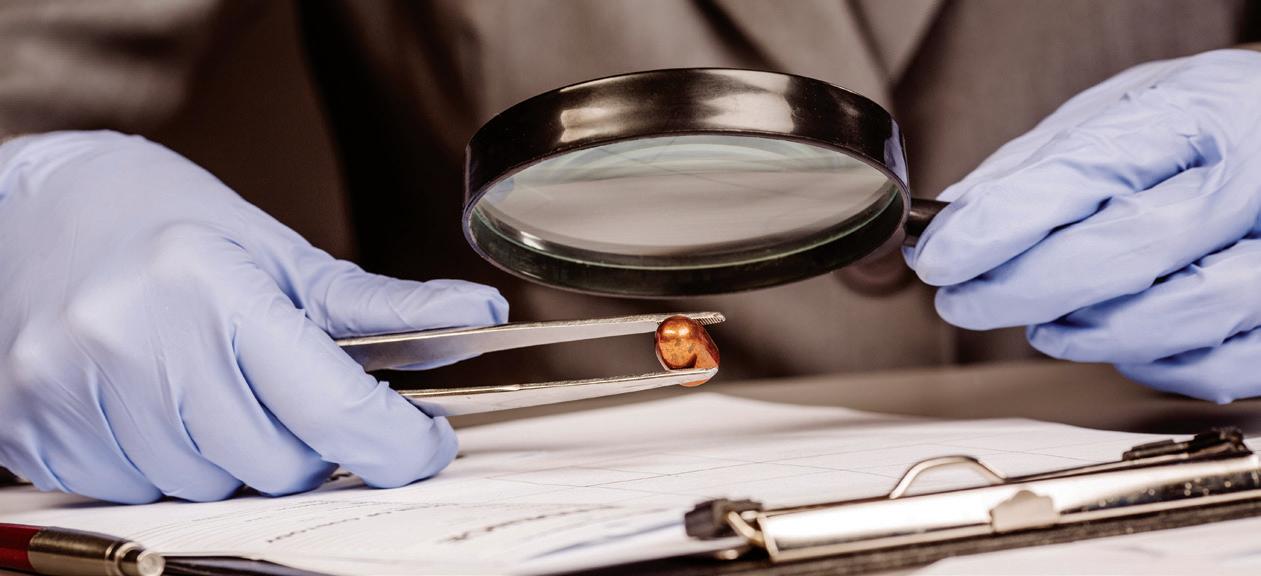
Forensic Firearms Facts for Investigators
by Deborah Stonebarger, Analytic Investigations
“Forensic firearms identification can help solve crimes by associating firearms evidence between multiple crime scenes or between a specific firearm and evidence from one or more crime scenes.”
The topic of firearms, particularly as it relates to criminal casework, is one private investigators are likely to encounter frequently. In this article, we’ll discuss relevant firearms-related terminology and testing to help you better comprehend discovery and other information you review for your cases.
For starters, did you know that the term “ballistics” is often inaccurately used to describe the practices encompassing firearms evidence testing? As defined by the Association of Firearm and Toolmark Examiners, ballistics is the science of projectiles in motion. Interior ballistics refers to the projectile’s motion within the firearm, while
exterior ballistics studies the projectile’s motion between exiting the firearm and its target. Terminal ballistics encompasses the projectile’s impact at the target, while trajectory refers to the path the projectile takes between the muzzle of the firearm and its target.
The terms “ballistics” and “trajectory” are relevant to crime scene reconstruction but have nothing to do with determining whether evidence at a scene, such as a bullet or a cartridge case, was fired by a specific weapon. Forensic firearms identification is the correct terminology that answers important questions, such as whether two bullets recovered from separate crime scenes
were fired by the same weapon or whether the bullet recovered from a victim was fired by the suspect’s firearm.
Foundational Terms
Let’s take a step back and review some basic terminology related to firearms and ammunition that will lay a foundation for understanding forensic firearms identification. First, there are the components of the ammunition. The main components of a cartridge, or a round of ammunition, are the cartridge case, the primer, the gun powder, and bullet.
The bullet refers to the projectile only. Using the word “bullet” to refer to a cartridge is technically incorrect, but quite
34 Working PI | Summer 2024
common. The cartridge case holds the bullet (or projectile), gunpowder and the primer. The primer is a small cap that, when struck by the firing pin, sets off a spark that ignites the gunpowder inside the cartridge case. Ignition of the gunpowder causes a rapid expansion of gases inside the confines of the cartridge case, which propels the bullet out of the cartridge case and down the barrel of the firearm.
While there are a lot of components and terminology related to firearms, I am going to limit this discussion to items related to forensic firearms identification. Thus, what follows are some of the components from handguns (many of which are also present in rifles and shotguns) that leave marks on bullets and cartridge cases that are commonly used in forensic firearms identification: chamber, breech face, firing pin, ejector, extractor and barrel.
The chamber holds the cartridge prior to being discharged in the firearm. The breech face is part of an assembly that locks into place at the rear of the chamber prior to firing the gun, and it is seated against the base of the cartridge. A firing pin is the part that strikes the primer of the cartridge causing the spark that ignites the gun powder. The projectile detaches from the cartridge case and travels down the barrel of the firearm prior to exiting. Extractors and ejectors are components found in semi-automatic handguns. The extractor pulls the recently fired cartridge case out of the chamber, and the ejector pushes the cartridge case out of the firearm.
Function Test
A common type of firearm examination in the laboratory is a function test. This includes examination and documentation of the firearm in question. The firearms examiner will note the type of firearm, including the manufacturer, model, serial number, the type or size of cartridge the firearm is chambered for, the action of the firearm, rifling characteristics like the num-
ber of lands and grooves and direction of twist, and other relevant information. The condition of the firearm is also documented, paying particular attention to anything that may alter the functionality of the gun.
After documentation, the firearm will be fired to ensure that it operates appropriately. If functionality is the sole purpose of the examination, the firearm can be fired into a berm or backstop from which the bullets cannot be recovered. If firearms identification will be required, the firearm will be discharged most commonly into a water tank, so that bullets can be recovered for further examination. Cartridge cases are usually collected, even if they aren’t needed for firearm identification purposes.
NIBIN Hits
Depending on the circumstances of a case, photographs of a fired cartridge case will be entered into the National Integrated Ballistic Information Network (NIBIN), a database maintained by the Bureau of Alcohol, Tobacco, Firearms and Explosives. NIBIN automates the comparison of some features of fired cartridge cases. A NIBIN “hit” can give an investigative lead, indicating whether cartridge cases from different crime scenes may have been fired from the same weapon or whether cartridge cases from a crime scene were fired from a firearm recovered in a case.
It must be stressed that a NIBIN hit gives an investigative lead only, not an identification. NIBIN can give results showing multiple possible “hits” among fired cartridge cases with similar markings, but not all of the possible hits will be true identifications. In addition, sometimes none of the cartridge cases selected by NIBIN will lead to identifications.
Only a qualified forensic firearms examiner is capable of determining if a true identification exists. Private investigators should be cautious when reviewing discovery that mentions NIBIN hits and make sure that evidence listed as a NIBIN hit is further examined by the lab.
Keep in mind, there are law enforcement and prosecution agencies that report a NIBIN hit as an identification. This may be due to ignorance or a deliberate attempt to mislead the defense.
‘No-Gun’ Cases
Another type of forensic firearms examination is known as a “no-gun” case. In this instance, expended bullets recovered from a crime scene or victim are examined to determine rifling characteristics. These characteristics include the number of lands and grooves, the direction of twist, and the width of the land and groove impressions.
The characteristics can be entered into another platform known as the General Rifling Characteristics database, which is maintained by the FBI. The database provides a list of firearms, including manufacturer and model, that possess the same general rifling characteristics. This information can be shared with law enforcement, so they know what type of gun was used in a crime, even when the gun is not recovered immediately.
Lab Work
Forensic firearms identification examination in the laboratory encompasses the examination and documentation of the evidence firearm, function test, test-firing the gun and collecting the expended bullets and cartridge cases, as well as subsequent microscopic examination of the toolmarks made on the expended bullets and cartridge cases. Generally there are three to four testfires created from a firearm. The testfires are considered to be the “known” standard because it is known that they were fired in the evidence firearm.
The toolmarks on the test-fires are intracompared to ensure that the marks are reproducible. A representative test-fire, or known, is then compared to each expended evidence bullet or cartridge case (the unknown).
35
Summer 2024 | Working PI page 36
The primary toolmarks that forensic firearms examiners analyze and compare on expended bullets are striated markings on the land impressions. The primary toolmarks that examiners analyze and compare on expended cartridge cases are those made by the firing pin/firing-pin aperture and breech face marks. Firearms examiners also analyze extractor and ejector marks on expended cartridge cases, but these marks are not often used for identification purposes. Toolmarks can also be made by other parts of the firearm that were previously discussed.
Drawing Conclusions
Forensic firearms examiners have five main conclusions they can reach after examination. The conclusions are based on class and individual characteristics. Class characteristics are features that indicate a restricted group size. Barreling with five lands and grooves with a right twist is an example of a class characteristic. Not all guns have these rifling characteristics, thus the group
of firearms is narrowed into one that’s more restrictive. Individual characteristics are random and unique marks that can be caused by wear, corrosion and damage of firearms surfaces.
An identification means that the expended bullet or cartridge case was fired by the firearm that was test-fired. To reach the conclusion of identification, all class characteristics must be the same between the known test-fire and the evidence, or unknown, item, and there must be sufficient corresponding unique, individual marks. An elimination means that the expended evidence bullet or cartridge case was not fired by the firearm that was test-fired. Disagreement of class characteristics is an instant elimination, and disagreement of individualizing marks would also lead to an elimination.
The other possible conclusion is inconclusive, in which the class characteristics are the same but there isn’t a suf ficient amount of individual marks to reach either an identification or an eli-

mination. There can be an inconclusive result leaning toward an identification in which there are some corresponding individual marks but not quite enough to reach an identification. There can also be an inconclusive result leaning toward an elimination where there are some observed differences in individual marks but not enough for an elimination.
Bringing Value
Forensic firearms identification can help solve crimes by associating firearms evidence between multiple crime scenes or between a specific firearm and evidence from one or more crime scenes. Ballistics and trajectory can help solve crimes by providing information to help reconstruct the events surrounding a crime. Forensic firearms identification can also provide exculpatory evidence.
PIs who understand fire-arms-related evidence provide a better ability to assist their attorneys and clients, and ultimately the justice system.



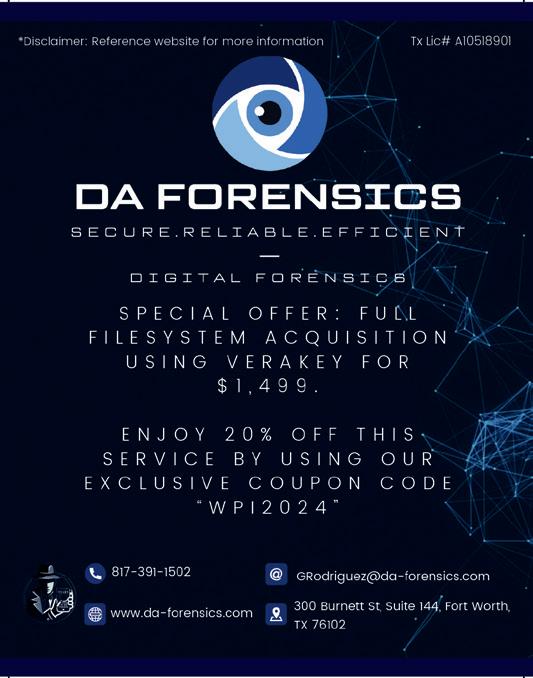
36 Working PI | Summer 2024
page 35 We are a team of dedicated professionals with broad experience in providing a variety of effective solutions. Your one-stop shop for all investigations in Mexico www.piservices.mx email: info@piservices.mx Tel: +52 (55) 8860 8835 Iguala 12 Bis, Col. Roma Sur México City, C.P. 06760

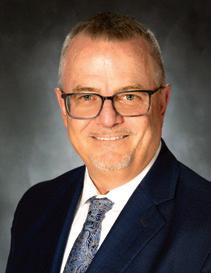

New TALI President Puts His Stamp on Modernizing the Association
by Tony Jones, Senior Editor
“Central to his presidential vision are steps to modernize the association’s functions to help grow membership and increase engagement with its participants.”
Bob Washington won’t be sworn in as the new president of the Texas Association of Licensed Investigators (TALI) until Oct. 5, but he’s already making his mark. Anxious to help the 53-year-old trade association evolve and grow, the presidentelect has a clear vision for building upon TALI’s mission to serve private investigators through continuing education, public awareness, advanced certification, networking and legislative involvement.
Washington knows first-hand the benefits an organization like TALI can provide private investigators. As a full-time, in-house investigator for Noteboom, a Texas law firm that specializes in serious and catastrophic injury cases, Washington isn’t required to carry a license with the Department of Public Safety (DPS) because he legally can work under the license of the firm’s attorneys.
In his role with Noteboom, Washington wears many hats including serving as office manager and supervising the construction of trial exhibits and video productions. But as one of two investigators on staff, he specializes in locating difficult-to-find witnesses. He’s also bilingual and facilitates the relationships between the firm’s attorneys and its Spanish-speaking clients.
Though he began investigating personal-injury cases for the firm in 2003, he didn’t pursue his PI license until 2014. “I became licensed because I wanted to be more professional and add more clout to my reports and my word,” notes Washington. “It made me a better investigator. Now, I help mentor other investigators and, in turn, they ask me to help them with cases, which translates into new business for our firm.”
Pursuing his license also exposed Washington to TALI, and he quickly saw how the association could help him and others improve their skill sets and grow professionally. He joined the organization’s board of directors in 2018 and has served as a regional director, director at large and, now, president-elect.
Central to his presidential vision are steps to modernize the association’s functions to help grow membership and increase engagement with its participants. Washington recently sat down with Working PI to discuss three key initiatives already underway.
Membership Drive
Notably, TALI is part of a cooperative known in the private investigator community as the Big 3. Together with the California Association of Licensed Inves-
38 Working PI | Summer 2024
Bob Washington
tigators (CALI) and the Florida Association of Licensed Investigators (FALI), TALI is among the largest state associations in the nation and works cooperatively with CALI and FALI to bring professional services and networking opportunities to members.
One of the unique byproducts of this synergistic relationship is for investigators outside of Texas to gain provisional, nonvoting membership to TALI, which offers access to the association’s listserv for networking and referrals, online exposure to the public via TALI’s “Find an Investigator” directory as well as the ability to participate in the association’s continuing education.
Available now through the end of the year, TALI is offering its Big 3 annual membership dues for $87.50, half off the normal $175 price tag. Washington believes once investigators leverage the one-time offer, they’ll be hooked on the association’s benefits. “I want to convince investigators around the world that if they pay half price the first year, they’ll happily pay full price the following year,” he says.
Beyond growing TALI from its current membership of about 600, Washington believes there’s true value in the shared insight, experiences and opportunities new members bring as well as what additional financial resources can afford. “I don’t really have a number goal,” notes Washington. “I want to increase professionalism, education and grow, so that we can afford to do more for our members.”
New Website
As part of Washington’s goal to improve how TALI engages with members as well as the public, the association launched a new website in June that functions better with mobile devices (there’s also a new mobile app) and expands site features and functionality.
“Just a year prior, we spent a lot of money with a web company, but the site just wasn’t functional. We gave them a probation period to try to get it right, but
they got only two of the issues fixed,” explains Washington. “This new website is much more user-friendly, much more current and up to date. This is the first time we’ve been able to do everything connected to our website or our association on our phones.”
Among the site enhancements is a connecting link to DPS, direct access to continuing-education certificates rather than having to wait to receive documentation via email, and improvements to the aforementioned “Find an Investigator” feature.
The new directory allows TALI members as well as the public to search for investigators by filtering for name, ZIP code, city, specializations and other criteria. Any investigators who are TALI members, including affiliate participants around the world and via the Big 3 setup, are eligible to be listed in the online directory. In addition to contact information, listings can include a headshot photo as well as professional credentials, such as experience with Homeland Security, the CIA, etc., or current specialty services like forensics.
“It’s a service to our investigators, but it also shows the public who we are, what we do and what we stand for,” says Washington.
Conference Format
Changes to engagement will also be felt at in-person events, particularly TALI’s annual conference. Though formal education classes and professional-development opportunities for new private investigators and seasoned veterans will remain staples of the association’s offerings, the formal aspects of education during the annual conference will be deemphasized beginning this fall in favor of more entertaining programming and networking functions, notes Washington.
The change stems from how TALI has been able to deliver course credit via online platforms since the COVID-19 pandemic. In Texas, licensed investiga-
tors are required to complete 18 hours of continuing education every two years. At just nine hours per year, those requirements were typically met in person during the conference. But with TALI now able to host five monthly Zoom classes as well as two mid-winter educational seminars in different locations around the state, Washington and other board members felt the time was right to up the fun factor during its largest live event.
“Our conferences are no longer about education,” asserts Washington. “They’re about networking, working together and sharing ideas on similar cases, and entertainment. So, we’ll have more cocktail mixers and more team events. Where we previously incorporated more fun with our social events, now we’ll also be doing it with our speaker sessions.”
Washington’s inspiration for the change came from attending attorney conferences. “They have a lot of fun, and they all can’t wait to go back to the next conference,” he says. “I want investigators to have that same feeling.”
To that end, this year’s conference, which takes place Oct. 3-6 in Arlington, Texas, will feature some true-crime elements during the heart of the event on Oct. 4 and 5 that are designed to pique the interests of attendees. The first and last days of the conference will continue to feature more formal education. For example, Oct. 3 will offer eight hours of new investigator training, along with a pre-conference speaker (the National Council of Investigation and Security Services will also hold its annual board meeting), while Oct. 6 will feature an eight-hour certification course taught by Brandon Perron on forensic interviewing for criminal defense investigators.
Among the speakers lined up for Oct. 4 and 5 are:
• Dan Riemer, who worked as a criminal defense investigator during the famous Palm Beach, Florida, “Killer Clown” case (See “Killer Clown Case
39 Summer 2024 | Working PI page 40
Resolved by Defense Investigator” in the Summer 2023, Volume 4, issue of Working PI ).
• Author Peter Houlahan, who has written a new book titled, Reap the Whirlwind: Violence, Race, Justice, and the Story of Sagon Penn, focused on a 1985 case in San Diego that left two white police officers dead and a young Black man, Penn, acquitted.
• Journalist Rena Pederson, whose fifth book, The King of Diamonds , chronicles the true story of an uncatchable jewel thief who baffled police and tormented high society by brazenly stealing from the megarich in 1960s Dallas.
Houlahan and Pederson will both conduct book signings during the event, while Pederson will also participate in a special award ceremony connected to the King of Diamonds case. “They couldn’t catch this thief
for a long time,” notes Washington. “Finally, one detective solved the crime, and he’s currently a TALI member. He’s in his 90s now, and we’re going to give him a lifetime achievement award this year. Pederson will present it to him at our conference.”
Washington points out that what constitutes “fun” in the PI space may not be true outside the profession. “When I say fun, it’s relative to our industry. What’s fun for a private investigator may not be fun for your average person because we’re not very normal. We call that entertainment, not education, because while they may teach us how to solve that particular crime, for investigators, that’s very entertaining.”
Visit www.tali.org to learn more about TALI’s services and events.
Stay Informed
Working PI is the only magazine available to all PIs at no charge in print and online! It’s FREE— the way PI news should be.
Receive every print issue AND get the latest PI news via email.
Opt-In for the Digital News at WorkingPImag.com
The latest news—delivered right to your inbox twice a month.
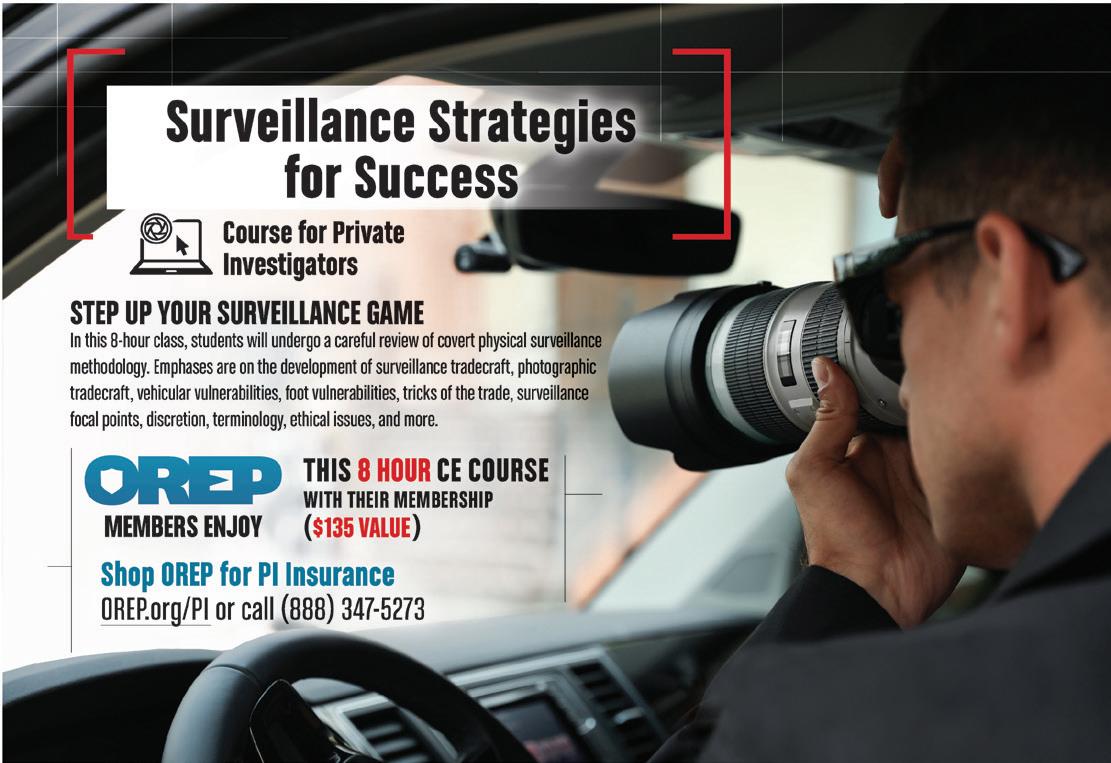
40 Working PI | Summer 2024
page 39
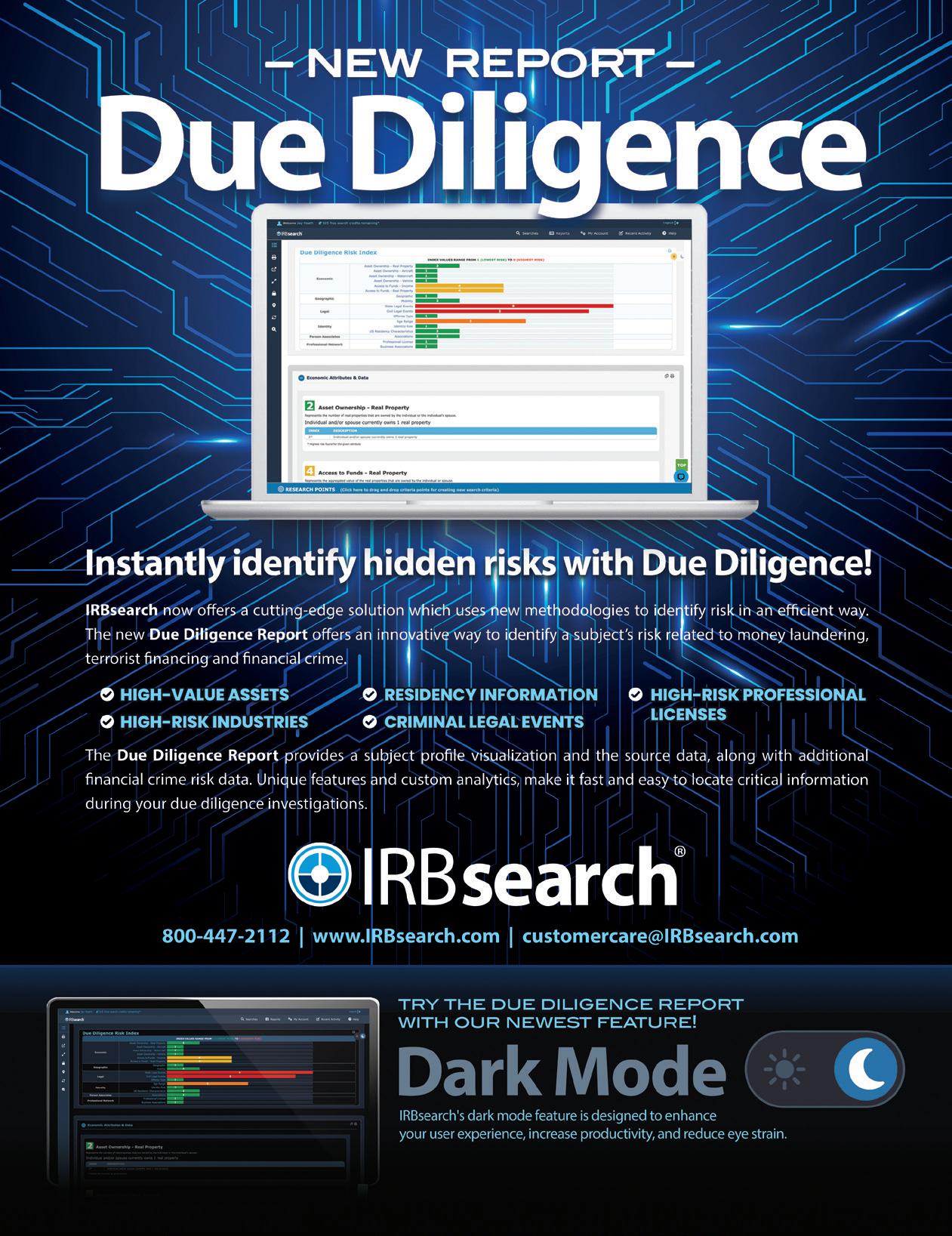

Industry-Leading Insurance for Professional
Few Programs truly specialize in Investigator Insurance.
We Do. It Matters.
Whether you’re out in the field, or doing background research from your office, OREP’s got you covered.
Investigators
General Liability and E&O Coverage in a Single Policy
Includes 25K in Business Personal Property Coverage
Includes 25K of Business Income Coverage
Comes with Blanket Additional Insured
Includes Security Consulting and Executive Protection
13,000 Professionals Trust OREP with Their Insurance
Calif. Lic. #0K99465
Over
Visit OREP.org/PI Today!

















































 Tony
Tony Jones, Senior Editor of Working PI
Tony
Tony Jones, Senior Editor of Working PI









 - Dorothy Grutzner Vandergrutz Investigations Agency
- Dorothy Grutzner Vandergrutz Investigations Agency


















































